#it’s literally just an actor playing a character manipulating another character but like i’m ‘!!!’ about it
Explore tagged Tumblr posts
Text
.
#i take it back the grifter plot in Anne with an e is diabolically brilliant#the guy that plays nate alters my brain chemistry in every scene it’s a shame it doesn’t look like he’s been in anything since 2019#like i guess i’m throwing Internet Terms around but who cares—Nate grooms & trauma bonds with these kids (anne & jerry) & it’s just—#like he’ll act guarded around Anne to push her curiosity & then go off on her when she’s curious but then calm her down & compliment her#& then with him & jerry. the scene where he tried to make him drink?? i felt like a hunted rabbit watching that wtf#it’s literally just an actor playing a character manipulating another character but like i’m ‘!!!’ about it#rose.txt#tw grooming mention#in my dark media phase once more lets gooo
1 note
·
View note
Note
can we have the moments where Mike Faist and actress!Reader have a fun friendship during their promotion of the new movie drama, thriller, literary human psychology as D. Fincher movies, their characters have an intriguing and complex love interest (he plays an ambitious, manipulative, intelligent main character and she plays an independent, passionate, sweet character)
Several clip interviews, Q&A with the rest of the cast, preview, defined their relationship, as if the fans ship them because of what they say to each other or others about their chemistry on set or their actions moves towards each other (like mike and reader as friendship goal, teasing each other for 4min, being a old married couple, chaotic moment...) and audience reaction. :)
R and Mike connected instantly, from the very few days on set. They developed a strong bond, a tight friendship throughout their work experience. And of course, like it happens for every couple of male and female actors in this industry, they were being shipped all over the internet.
The amount of clip compilations all over the internet was enormous both complementing their friendship and their alleged romance.
Reader and Mike being cute for 5 minutes
There was a clip of her passing behind him on the red carpet while he was doing an interview. He sees her and says “Hello” smiling at her. She says “Hello” imitating his tone and casually touching his shoulder while passing to reach her interviewer.
Another clip showed the two of them literally mirroring each other and then noticing the action and laughing it off. Oh, and if that wasn’t cute enough she touched his leg while laughing.
They went on Agree to Disagree together and let’s just say that the amount of eye contact they held up to each other was crazy.
The question was: “I am the best karaoke singer on the team”
Mike scoffed and put the glass of water on “strongly disagree” while Reader put it on “disagree”.
“If you’re there I’m definitely not the strongest singer at all,” he says.
“Oh shut it, Jake Kelly” she responds, referring to his role of understudy in Newsies.
Another clip showed Mike casually removing a hair from the sleeve of her sweater.
“What’s the best thing about playing your characters?” they got asked in an interview.
Mike said: “I mean my character is not really a nice person. But I think the best thing is really that, you know, like getting to study how his mind works and why he’s doing specific things. He’s manipulative and mean which is not easy to be when there’s R working with you…” he answers.
She chuckles, “You did great tho, you delivered amazingly” she says.
“Thank you, thank you”
R and Mike Faist being a married couple for 7 minutes
“When you’re in the room when she does what she does it genuinely changes the air in the room and everyone is completely stunned by what she does” he said in an interview while she was next to him shaking her head no.
“Not because I have to say something nice back but really watching Mike Faist performing in front of you leaves you astonished. He’s such a deep feeler, first of all as a human, and that helps him amazingly with his acting. He’s brilliant” she says back.
There were a few clips on set. One when they laugh when he messes up his line and another one when she adjusts a piece of his hair from his face.
But the cutest and fan favorite is the clip where Mike defends R after some sexist comments about her clothing in the movie.
The comment sections of course were crazy as well.
“OMG they’re the cutest”
“Honestly I’m a little jealous but they’re so freaking cute together”
“Notice how Mike is always the quietest in interviews but when he’s with her he’s constantly participating”
“Uhm… why is no one talking about her hand placement in the first clip”
-”Also him clearing his throat before continuing speaking after she touched him”
“The other cast members are just existing while they’re blatantly flirting with each other”
“Their chemistry in the movie was palpable and after this it’s obvious why”
“Am I the only one that heard him call her “darling” while thanking her after she complimented his acting?”
-”NOOO, I heard it too, oh my god they’re so cute”
“He just looks so at ease with her”
“There’s no way they’re just friends, come on”
-”Absolutely not. All that touching seems done before”
“Their compliments to each other are adorable, there’s so much estimation between these two”
“The way he stood up for her after those horrid comments. Mike Faist, the man you are”
“He looks at her so lovingly, I’m gonna cry”
“That should be me but that’s also my queen, so it’s fine”
“GIIIIIRL, she’s down bad”
“He would be one of the best looking guys she’s ever been with”
“They honestly fit each other soo well”
Of course they never dared to admit or confirm a romance but a picture of him at the opening night of one of her broadway shows started a fire of rumors that wasn’t so easy to extinguish.
121 notes
·
View notes
Text
Complain time again tee hee but I’m just like UGHHHH talking genuinely to these ppl is SO hardddddd
With girl A, I spent almost a whole class lecture (friendly) debating with this one girl on why people medically diagnosed as psychopaths and sociopaths are not inherently dangerous, are not narcissistic by default and how ‘masking’ is not a form a manipulation. Her source for all of these… You. The Netflix show…
With girl B, I feel like she’s sooooo,,,, dismissive ?? Idk like I tried to introduce her to my friends once and she genuinely did not gaf. Like I said hi B this is C then she says hi to me and me only. Like my girl C is right here. But at the same time she’s always bringing me into her friend groups which is fine but I dont connect easily so most times I’m kinda just there SPECIALLY if it’s an all men group when I have specially told her I tend to be uncomfortable with men for “no” reason
I was having a conversation with girl A and the topic of autism was brought up, I told her that I think I may be low on the spectrum but there are some things I tend to relate to with autism behaviors, and considering opened up to me about her anxiety and how she had previously talked very openly abt diagnosis I thought maybe she’d get it. I know,,, self diagnosis (u are free to feel any type of way abt it) but idk I thought she’d have any type of nuanced comment about it but I should’ve known from the psychopath talk… I had told her that I find meeting new people very hard, I have difficulty talking to said people and I tend to be very restrictive about who I make a meaningful connection to. She said that my personality is and I quote “mamona” (jerk/snob/asshole ish) and completely dismissed my masking, overstimulation, 10 year old special interest, taking shit to literal and not understanding social cues or instructions as “just being different” yeah so I thought… yknow I might not have autism valid but idk I felt so ignored at that moment
Also don’t think I just unpack shit on her unannounced, we talk and convos play out as they usually do and since the topic was out I was like sometimes I wonder if I have it because of so and so plus she was unwinded with me before so it wasn’t impossible for us to talk abt personal stuff, even though we not so tight we are still close
Another thing I’m very bad at making friends, I think I mirror good enough to have nice interactions with people but not to the point they invite me to shit or talk to me outside of classes. Back when I was in my exchange program I was sharing a room with 3 swifties so I had to pretend to like Taylor swift so I wouldn’t feel singled out, I also watched the summer I turned pretty and witnessed these girls thirst over bad boy #2 when I thought the character was so shitty (the actor is good looking but I’m not attracted to him) and also would also unknowingly spend all-nighters on school nights (as in I didn’t know they were meant to be all-nighters) with them watching a movie I didn’t particularly like and see everyone thirsting over annoying man on screen (one of them was some straight outta wattpad step-sibling story ew, the other pride and prejudice IM SORRY YALL I DIDNT GET THE HYPE 😭 call me uncultured it’s okay
A and B are sólo also hardcore swifties and I can only be neutral abt her otherwise they get on my ass about it and saying I like Taylor swift or her music is too big of a lie even for me
I told girl A about this (or at least a bit) and she said that I should’ve just been me. Girl I can’t be me we were both witnessing a girl being actively bullied (tv show ass bullying they printed a picture of her and drew over it ugly, taped it to her dorm room. Still hurtful and bullying tho) I’m NOT about to ostracize myself
HOWEVERRR these are not my main friends, these are like the friends I made to not be lonely in these extra classes for an American 🦅🦅🦅 diploma. My close CLOSE friends are from my same career classes and they are so much more understanding and can interact more naturally with. So in my day to day I got good genuine friends by my side
I recognize that I can be perceiving these memories differently than how they actually happened, misinterpret their actions and just be in my feeling right now but idk I feel like I’m so difficult and constantly just have to comply with people in order to make others comfortable
18 notes
·
View notes
Text
Random Thoughts
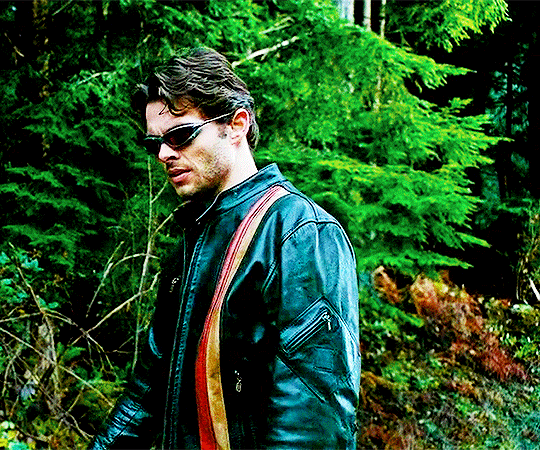

Random thoughts. As much as I am an X-Men fan I’ve been thinking lately about X-Men Apocalypse and how that film did such a HUGE disservice not only to Oscar Isaac, who in my opinion was HORRIBLY wasted in that film, which blows my mind given that he’s such a talented actor. Like seriously how could you not want to showcase him and let him run with being such an iconic villain and deliver a story for him to sink his teeth into? *sigh*, but that’s not what I’m in the mood to talk about right now. My BIGGEST complaint about that film is the characterization of Scott Summers. It’s something that’s troubled me from when I first saw the film.
Now let me preface this by saying that I have nothing against Tye Sheridan. Before Apocalypse came out I went and saw Scouts Guide to the Zombie Apocalypse to familiarize myself with the actor because so many people were talking about how he was such a fantastic actor and how he would be PERFECT for Scott. I was skeptical, but willing to give him a chance because Scott Summers is my favorite character. Has been for a very long time. In Scouts Guide to the Zombie Apocalypse the character Tye Sheridan plays is so much like Scott that I was hyped to see him in the role until the movie finally came out and I realized that the character he was in X-Men Apocalypse aside from crushing on Jean Grey was most certainly NOT Scott Summers. (For those who want to see Tye in a Scott type character, I’d recommend the film that I mentioned above as he was more Scott there than he was in Apocalypse.) Scott is NOT a bad boy, rule breaking, smart mouth snot. I’m sorry, but that’s never been Scott. He’s not the ‘cool dude’ or Alex’s hip little brother who is edgy like Alex is in the First Class films.
To those who don’t read the comics, I’ll just toss this out there. In the comics Alex is the younger brother and Scott literally gets brain damage saving his brother from the trauma of jumping out of the plane when their family is being attacked and their parents ‘died’. It’s such a tragic, interesting back story that leads to the ups and downs of Scott through the years with psychotic ‘father figures’ who experiment on/torture him, force him to use his powers for evil purposes until Charles saves him. The bond between Charles and Scott is one of the strongest ones in his life even if Charles has become a bit of a tyrant over time in how he manipulated Scott to do this bidding, but that’s another story for another time. Scott’s young life before the X-Men was loaded with pain and trauma where Alex was off adopted by a family and Scott was the obsession of a madman who for some reason was obsessed with the idea of breeding the perfect genetic mutant with him and Jean Grey...again another issue here lol.
That being said though Scott is shy, awkward, a lot of people have speculated autistic as well and there’s so much about Scott in his social awkwardness and his inherent self doubt/loathing as a teen that defines the man he becomes in the future. His rise from the shy, awkward kid too afraid to admit his feelings to Jean Grey or feel he was worthy of the role of leader that Charles bestows upon him to the strategic powerhouse he becomes is lost in Fox’s lame attempt to make someone that might be marketable to an audience who thinks it’s fun to see a a bratty fun cool guy who can come up with mischief. Now I love Scott. I do, but he is neither a bratty fun guy or a prankster. His sense of humor...well, really isn’t most of the time. It doesn’t fit who he is. Bobby was a prankster and a practical joker, but Scott is very serious almost to the point where he knows he’s not the popular guy that people gravitate to. He’s not the fun guy who is the life of the party, but rather he’s the guy who gets the job done and saves the day. He’s the guy with plans for his plans, etc. and he fights for his people with all that he has taking what he’s learned through the years and applying that knowledge to doing right by mutants and humans alike.
In a lot of ways Scott’s almost like a blend of Charles and Magneto as he’s evolved into his own man. I cannot stress enough that there is so much to LOVE about this guy, who by his beginnings had what could’ve led him to be a villain as that’s the kind of backstory he had, but regardless of the struggles and angst he became a hero and a leader. His story is so inspiring and really gives the character depth which is why he’s my favorite. Fox NEVER got that.
In the first three X-Men films, they minimized Scott’s appearance to showcase Logan, but James Marsden was a fantastic casting choice (height aside). He brought so much to the character with what little was given to him to work with. His performance is always overlooked, but James expresses so much emotion without the benefit of his eyes, which is a difficult task for actors. Some popular actors who were offered the role in Apocalypse originally turned it down for that very reason of not being able to use their eyes. James more than delivers and is very underrated. Now, none of the first films will give a casual non-comic reader the full story on Scott, but I hope that those who haven’t seen the first films take the opportunity to at least look at those films and that Scott to see a glimpse of who he is and not the character with Scott’s name and his powers that doesn’t display who he is. Now I know some people liked the version in Apocalypse, but it’s so disheartening to know that those who never read a comic or saw the old films will ever understand what makes Scott so great. He’s truly the underdog that ended up saving his people and becoming one hell of a leader. The complexities of his relationships are another dynamic of what makes him great.
There is so much to love about Scott and it makes me sad when I see so many fans who never were able to see that because Apocalypse was their first and only view of him. They were truly cheated and to this day it always makes me want to flood the blog with information and reference to Scott so people can see just how amazing he is as a character. Heck, even X-Men Origins which has a lot of problems in it did a better teen Scott than Apocalypse is so if someone wants to see a teen Scott that shows signs of who he will become, I would recommend that film as well for that alone. Like I cannot stress enough how much I hate that so many fans will never know how great he is. I literally went back and forth with a professor about how great Scott was, but with Fox not delivering it was so hard to share to only a film goer why my favorite character is so amazing since all people see is what little inaccurate crumbs that Fox gives. *rant over* Sorry it’s just sometimes I feel like letting this out because I hate how Scott gets overlooked or changed because those in charge don’t care enough to give the guy what he really deserves in a story especially in the film world. I do hope that the MCU does better.
#Scott Summers#Cyclops#comics#movies#this is a scott summers fan blog#rant#talk about my favorite#i hope people give him a chance#fox did not do him justice
38 notes
·
View notes
Text
genisys should’ve went harder
Looking back at the shattered remains of Terminator Tumblr that I sit, nearly alone, In. It looks like I may be in the minority of people who actually liked Genisys as a movie? I thought it was pretty good - like Salvation it has a lot of interesting lore elements and character moments but they’re usually lost to dumb  decisions or distracting the audience with stuff that goes Boom.
Honestly there was several elements in this movie that I really loved and I just wish they actually expanded on instead of the weird as fuck emotional manipulation baby skynet?? I just. Why. Why. Why. Why. Not to mention the fact it was somehow in the OG timeline despite being from one not yet created etc - anyways here’s me rambling about what I liked and what they should’ve done.
What about John’s feelings?-
This movie actually gets John right. For the first five minutes at least, swap it out with the og actors and I can truely believe it’s what happened before Kyle went through. This sort of great leader but also team dad vibe he had. (Also losing my mind he has the full side scar, but also distinctly the same type on his lip as Kyle in the og)

Then… it’s not John Connor anymore- I mean this literally as he’s outright killed and has his mind taken over by Skynet. He’s this “Zombie Terminator” thing that’s sent back to ensure everything happens, and recrute or kill his parents.
Motherfucker that is the perfect opportunity to add a scene or two of weakness, of him angsting privately or outright not understand why they’re scarred and resisting. Not understanding how this is a good thing and they’re trying to kill him. Have some of his calling not just be manipulation but genuine pain and confusion. His parents are trying to kill him. This is the one time he’s seeing them together and alive. The one time he actually knows who his father is and it’s practically his right hand man. It should be perfect…. But they’re resisting.
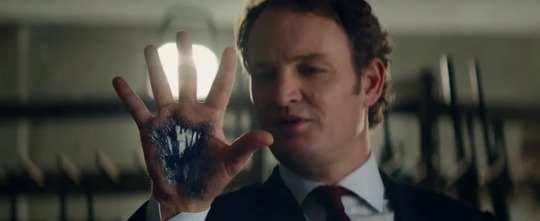
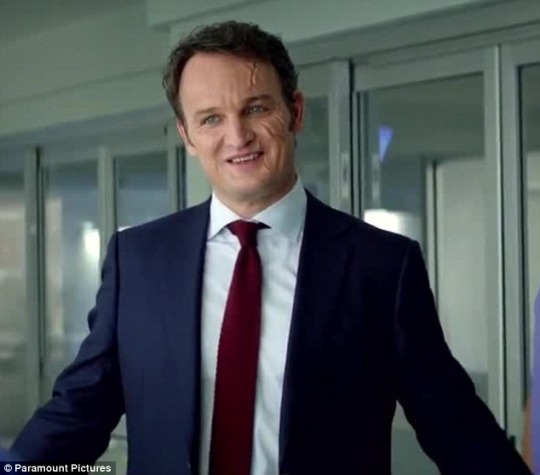
Have these moments where johns trying to fight the programming. That he’s not completely lost. That he’s fighting every fucking second it makes him hurt them. That he snaps in and out of it, he kicks cries and screams before it takes his mind back. One of the things I couldn’t accept in this movie is that it didn’t give us glimpses of John. Like he wouldn’t be fighting it, like he wouldn’t be hurt - they’re trying to play it off like he was completely gone and I can’t accept that.
Lack of connection-
Ok so besides it being the worst casting of Kyle Reese known to fucking man. (Seriously why is this J Crew MCU looking ass man playing a guy who was generally sort of scrawny and had scruffy hair. The buzz cut makes it worse. He’s supposed to be from the OG timeline but looks nothing like it. Did you guys even try?!)
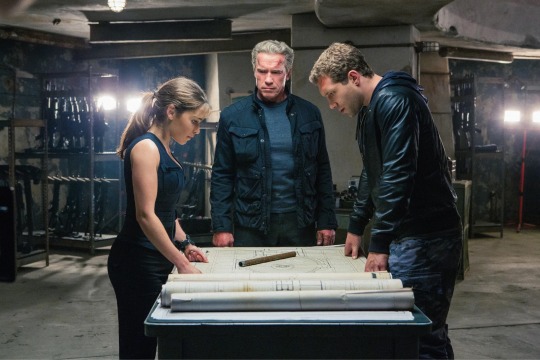
Despite being perfectly set up for a LOT of angst and deep character moments, meaningful exchanges etc… they’re really wasn’t anything. As much as I love teen angst Sarah™️. It was mainly them snapping, battle plan, run and fight. There was no padding. No heart to heart. Even the moments I’m sure they meant to be emotional just didn’t stike as hard, it was more of a exposition dump than emotion! The orignal had these good little moments when they hid or the fucking amazing deleted scenes between Sarah and Kyle,
Some points they could’ve and should’ve expanded on and were right there but they did nothing-
Kyle is even more lost then he was in the original. It’s not only another time but another reality all together. Everything he knows and thought he knew about the past is g o n e. have this as a emotional crux instead of Sarah yelling at him for not getting it
Have Sarah angst and be furious about the timeline that could’ve been. That she could’ve grown up happy, had friends , collage, a life that wasn’t weapons and preparation. that the future could’ve been blind to here until it happens.
Equally have Kyle grapple with the fact in this world he grows up normally. A regular fucking kid with parents , a house, trees, grass and everything. No war. No bombs. Nothing. He fucking meets this younger alternate self in a way that is WAY to casual- this kid has everything you should’ve and your like “yea ok here’s a pamphlet” I just- if I was a PTSD filled , trauma holding future war vet and saw a child me getting what I’d never have I’d ensure the kid has everything while mourning what I never had.idk they really didn’t push this as far as they did.
Pops. Not much to add just much more of him. I feel Sarah would’ve done the chip thing thatJohn did. Make him a bit more open and them both less cold. Proud robo dad V2 just😭
Have John also realize he’s from a nonexistant timeline. As he says this to pops but pops is from this timeline?? So if anything idve said it to Reese but idk
This was lightly pushed in the movie and had a real kick behind it but Kyle getting his head around John being his son. How he was much more protective from both a fanboy standpoint r and understanding he was actually his kid. This could’ve been used more or at least having it away Sarah in some sort of way bedsides her stubbornness.
#Kyle and John and they’re wild amount of daddy issues#80s movies#terminator#the terminator#the terminator 1984#sarah connor#kyle reese#john connor#terminator genisys#terminator movies#terminator franchise#T2#terminator 2#terminator 2 judgement day#t 1000#t 800#t3000
33 notes
·
View notes
Text
Some thoughts about Episode 2x12 of 911 Lone Star and subject of physical abuse. I’ll put behind the cut for those who don’t want to read:
I work in the field of abuse of adults and one of the hardest realities of my job is that I have to hold the word “abuse” lightly because the spectrum of what is experienced as abuse by the parties involved is wide, for many factors, including enculturation, personal history, physiological make-up, emotional maturity/intelligence, and mental health. There are legal definitions of what constitutes abuse/assault in every jurisdiction and there is the basic understanding of power/control and the role that plays in the relationship. Even the word “healthy” when it comes to relationships is difficult to define because what I regard as “healthy” is not something someone else considers valuable enough to work on or worth separating from their partner over. It is surprisingly personal and while I have laws that I enforce, the reality is that even when an incident meets the legal criteria, if the victim says it wasn’t abusive to them, there is not much we can do other than to keep offering the victim that there is another way to love and be loved.
That said, I’ve seen a lot of posts of fans very upset about TK’s shoving Carlos when he was angry. And I am not here to say that interpretation is wrong. However, I do understand why the writers and actors would have created that scene and not consider it all that problematic. Again, not justifying, simply offering some thoughts from someone who works in this field. These are my own and I know other investigators in my own unit who would think differently, so it is just one perspective. Also, I am not a sworn officer. I enforce civil law, not criminal.
1) I don’t believe TK’s reaction is out of character. When he is emotionally compromised, he self-harms. He does that with substances and we have seen him seek out fights (the bar which leads to the police station scene and with Judd, both S1) when he is upset. I read his pushing Carlos as self harm over abuse because his actions betray that he is trying to get Carlos to *hit him*. Which Carlos, being a police officer who is trained to remain calm (they are supposed to be anyway), responded by restraining TK. TK’s response is then not to calm down but to get more upset and tell him to leave because TK is *not getting the emotional release that he wants* which is physical pain. He wants to feel physical pain to mask his emotional pain but Carlos won’t participate in that. So this isn’t abuse in the typical way we understand it. It is manipulation on TK’s part and unhealthy as hell, but is actually in keeping with what TK does when he’s hurting emotionally.
2) This scene is highly-feminine coded. There are hundreds of examples in tv/movies where a woman is upset and she beats her fists against a man’s chest (who is almost never who she is actually upset with/about) and the man endures it for a bit and then restrains her until she calms down. We see it all the time and while also problematic, generally we don’t object to it because we view the woman as not being able to cause the man any real harm or pain. Women get away with a LOT of domestic abuse because of this bias. So given that trope, it is very possible that the writers and actors viewed this scene through that same bias. That TK isn’t really hurting Carlos because he is bigger and more muscular than TK. Again, not great, but something to consider when evaluating the choices made by the creators of the art in question.
3) The Fight or Flight response is so deeply ingrained, it is very difficult to stop. When I enter someone’s home as part of my work, I am there to investigate an allegation of abuse. Even with the word INVESTIGATOR on my chest, and with everyone knowing why I am there, there are some perpetrators who are so reactionary in their fight/flight response that they try to threaten and intimidate me (fight). They are displaying abuse behaviors to the one person you would logically think they would want to hide those behaviors from. And many do. But for some, they literally cannot stop the response. Makes my job a little bit easier because now I am a witness to their abusive reactions and can document it. In this instance with TK and Carlos, I’m not necessarily saying that response was triggered in TK, but again, he has a much higher propensity for Fight than Flight in general so I can’t say it’s *not* a factor either.
4) Many have expressed wanting to see the apology between them that was not shown. In some ways, I can understand why the showrunners chose not to. That should not be a quick conversation. And in the context of a show like this, where there is no other way to do it, I think would ultimately be worse. If TK apologizes and Carlos accepts without much conversation, there is no reason for anyone to expect the behavior to change on TK’s part. This actually models abusive cycles. Any conversation where Carlos confronts TK about his behavior would take real time because they’d have to get at the reasons why TK had that reaction in the first place, and given that Carlos has already addressed this (in their convo at the police station after TK is arrested for brawling) and it hasn’t changed. Therefore, the scene would need to either put Carlos in a role of continuing to bring this up while addressing why he is putting up with the behavior from TK, or Carlos needs to do some self-reflection about why he’s still in this relationship. So to do it in a way that is actually “healthy” doesn’t take them where the writers wanted them to be later in the episode. So, in many ways, their apology scene is best served by a well-written fanfic than it would be by a 2 minute on-screen scene that would either serve to perpetuate an unhealthy cycle or push them further apart. This way, there is an ambiguous element where everyone can pretend that some long-ass conversation occurred and the two of them came to a healthy resolution.
5) DV scenes between men are *way* bloodier than any other scenes I encounter. In my experience, when men are abusive of men, it’s very brutal. And again, what equals abuse is sometimes hard to define and even harder to address. So a little shoving, while not great, is also not even in the stratosphere of how bad it often can be. Is it right to view abuse with that kind of relativism? Hard to say. But when you exist in this world, it is hard not to and I have to go by the people in front of me and what they are expressing about how they feel about what happened. If you, the viewer, watched this and reported it as abuse, I could go investigate. But if TK and Carlos say to me, “Nah, we didn’t feel that at all.” Then it doesn’t matter what you, the witness, feel about it, or even me. I can offer my educated and experienced view, but that doesn’t mean the two parties will accept it. That’s why I have learned to hold it loosely because adults have the right to self-determination and the right to make poor choices. And believe me, that is very hard to do, especially when I encounter a victim who is clearly so beat-down that they can’t imagine anything better for themselves. But if I tell that victim, “You must...” then I am simply becoming the next person controlling their choices. Instead, I offer “You could...” or “Here’s some options...”
To me personally, I read TK’s shoving Carlos as evidence of unhealthy self-harm behavior more than TK abusing Carlos, because the action wasn’t rooted in power and control and ended fairly benignly. Would it be awesome for them to still address it? Absolutely. But I also understand why they chose not to.
222 notes
·
View notes
Text
OK BUT CAN WE TALK ABOUT LIKE... who the real villain is in wkm?
I think we all know who it is it’s pretty obvious it’s the house but I honestly think we don’t talk about it often? Literally that’s the mf who’s the real bastard here. ITS THEORY TIME 😼
While actor Mark is an asshole and technically a villain he wasn’t like like that before. Hell he was a generous man helping his friends and was a loved man. When Celine left his ass he was venerable af and the entity was like “TIME TO MANIPULATE THIS MAN FOR MY OWN GAIN” and made him the asshole the way that he is now. I think actor Mark thinks that he’s in control oh shit because he might of been told that but really the house is pulling the strings and making him believe that. He’s literally just about chess piece to use for this evil game of chess (lol analogy)
I’d also like to point out that Celine might of left actor because the house told her to. At the time actor wasn’t vulnerable especially with having a good life with his wife and having an outstanding career and the house probably didn’t like that. So in order to make him weak it took the only thing that he lived at the time, Celine. Another reason she left was because of bad vibes. That house is just infested with bad juju and Celine being a seer noticed that over time but back then since it was kinda discouraged to divorce especially for a women to do it luckily William knew and took her in. William has lived in the same house actor lived so I’m guessing he’s aware of the evil it contains since when he gets turned into Wilford hell even during wkm he isn’t weirded out by the things happening to the house and other weird shit. He was trying to protect Celine. Now again I just wanna say the adultery doesn’t excuse it still a shitty thing to do and William is still a stubborn a hole just as much as actor.
HOWEVER this situation is like novel: The Great Gatsby by F. Scott Fitzgerald (1925). (Btw if you don’t want spoilers skip this) in the book, daisy cheats with Gatsby behind Tom’s (daisy’s husband) back because like I said either during those times it was shunned for women to divorce their husbands and during those days women weren’t really independent back then. They were VERY pressured to get married and have children etc etc. Tom was an asshole to daisy and was even cheating on her but of course men and women back then had double standards where women couldn’t or should do this and same went for men. and I’m not saying that Celine didn’t love actor cause I’m sure they did love each other so much but it kinda explains why she left him other than just because. I also don’t think Celine was necessarily abusive nor do I think actor was at the time. Things got heated and the only scapegoat was to leave him and never return to that house again.
Another thing on my tiny pea sized brain is about the houses world. I have a theory that the house has created a universe inside it while Everything out side it is the original universe (or just our reality idk). This is why George (the groundskeeper) doesn’t appear in any of the new videos is because he wasn’t in the house during all this mess (in the character world idk if the actor for George just didn’t wanna be in the series but then you have to wonder why his portrait isn’t up in the hallway dark made in AHWM). You can think of the house as if it’s a movie set or a green screen. To us and the actors we see these worlds and weird shit when in reality there’s nothing there. Nobody actually dies in this universe because like movies no one actually dies they’re just not on the set. Even the side characters don’t really die cause us as the viewers revive them be just rewatching the video. Wilford knows people won’t die because 1. He’s seen his friend get up and walk around after being dead and 2. He knows that when people “die” they just come back by the help of your Or the entity. He acknowledges that in AHWM where he states that we can PAUSE the video. Almost none of the characters except Wilford has acknowledged that which makes me think he’s a lot smarter the we think or just has more common sense. Wilford is forgetful sure but that doesn’t mean he’s stupid he was a colonel for crying out loud one of the highest ranks in the US army lol. I’d like to also point out that Wilford uses this set ordeal to his advantage most importantly. In WKM we see William do it too by appearing one place then teleporting to another place. Kinda think of the house as the 3rd dimension. Wilford “escapes” that dimension to a new plane and can come back when in reality he’s just leaving what the house is previewing to everyone in the house. Everyone else In this universe except maybe actor, Wilford, and dark know that you don’t have to play along. These people in the houses universe are programmed to believe that they can’t escape have HAVE to play a character.
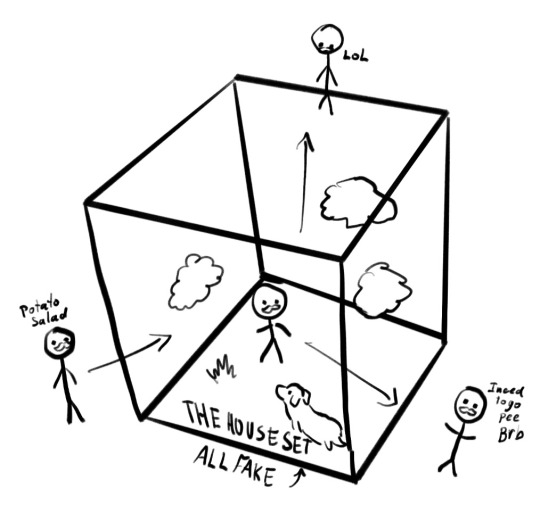

(Spoilers for wandavision) when I watched wandavision not that long ago it made me think about the MCU (not marvel cinematic universe😏✨ MARKIPLIER cinematic universe) and how it’s kinda like that. Wanda in the show creates this force field out of grief where everything inhabits it is turned into her liking of what fits the narrative. People are being held hostage to just play a part in Wandas sick tv show SHES made for her and her husband. People outside the forcefield are just normal people but once they put a person, object, etc it gets turned into what WANDA wants. I think that fits into the mcu because the house is EXACTLY like that. These mfs haven’t aged at all because time isn’t existing for their universe. Abe thinks that he’s been tracing down William for years but Mark said that “he thinks that but really wmlw is right after wkm” (that’s paraphrasing go watch the wmlw to get a better explanation LMAO) but like I said the house makes you feel like it’s been only years or days but it’s not even close to that.
With that all being said I don’t think anyone here is the real villain here or the hero. Like Mark said They’re all human which they have bad and good traits the only thing that’s the real asshole is the house. It’s like it’s a living breathing purgatory that creates chaos
BUT THATS JUST A THEORY
A GAME- or a youtube .. YouTube theory? YEA A YOUTUBE THEORY!
now mind you I’m not the best at writing so I’m sorry that none of this made sense feel free to correct me or chime in with your theories but I just wanted to share my theories and ideas :) and if you made it those far I’m sorry I wasted ur time HSJSJDJJSJD
#markiplier#my art#who killed markiplier#darkiplier#wilford warfstache#actor mark#a heist with markiplier#wkm celine#wkm william#wkm abe#wkm George#theory#Markiplier theory#I’ve been thinking about this all day since me and my friend talked about it LMAO#shit writing#lol#markipliertag2
206 notes
·
View notes
Text
Locke and Key season 2 episodes 1-3ish
Gabe/Dodge is doing a good job manipulating everyone. The way he so easily learned how to make a new key for one, and also the way he is subtly taking apart the Savini’s (or rather their trust and faith in Scot) and sabotaging Scot. Also, can we take a moment to appreciate the actor for Gabe? Like Griffin Gluck has been in a handful of medicore movies over the years, I’ve seen him around and he’s done an alright performance but I this is the first time I’ve seen him really in a serious type role. Point is, he’s actually a pretty good actor and it’s cool to see him in something like this.
I’m liking Kinsey so far a bit more this season than the last. Also, Bode remains the sibling with the most caution when it comes to the keys. It should not be a literal child who is the only one to think about testing to see if someone’s a demon or not by seeing if they can take the key.
Eden’s storyline is very much set up as the whole, subordinate to the bad guy gets fed up with r he bad guy and eventually works against said bad guy, most likely teaming with the good guys in the process. And like, I don’t have a problem with the storyline itself but it didn’t have to be Eden who got possessed. Like, her character had lots of potential and they just killed her off right away. There are so many other people who could have one way or another learned of the keys and then gotten possessed instead of Eden. Speaking of, isn’t she supposed to be good friends with Jackie? Has she been off screen pretending to be Eden after somewhat disappearing over the summer? And if not why hasn’t Jackie noticed that something weird is going on and I don’t know, mentioned it to someone? Even if Eden pretended to still be Eden Jackie should realize that something is off.
Also, it’s really sad what happened Erin and all but I really hope she doesn’t become a problem in the future. I mean, I’m guessing she has something to do with how Duncan will remember everything. (Or at least magic, maybe not the memories Rendell and co took from his head.) But yeah, I get that the keys are dangerous but doesn’t she realize that the Locke’s are the main characters and really need to know more about the keys, not her vague warning to be careful with no useful information. (There’s also the fact that the last person who wanted the keys was Dodge and that didn’t go well for anybody involved.)
I have no idea what angle Jamie’s father is playing but I don’t like him. He is deeply suspicious.
Tyler’s worry about not just him but Jackie and then eventually Kinsey and one day Bode forgetting the keys and stuff is entirely reasonable and I like his current storyline. His big brother energy really showed when he was talking to Kinsey about his concerns. Speaking of, I love his and Kisney’s relationship and just all the sibling dynamics in the Locke family. (As as one of the youngest in my family I do heavily relate with Bode at times though and not in a way that is very fun.)
Anyways yeah, currently in the middle of episode three and I am practically growling at the screen every time Gabe shows up so yeah that’s how that’s going.
#also I’m really nervous about the key house key#I hope Jamie keeps it safe#I really really hope her dad doesn’t get his hands on it#also yes nina yay for recognizing that glaring red flag#not please pursue this mystery with the same relentlessness you had in the first season#and also don’t fucking trust that dude
2 notes
·
View notes
Text
Thoughts on Grey’s Anatomy: 18X01
SPOILERS AHEAD!!!
I was really excited for the Premiere and I have never been so disappointed in my life. It took me a few days to write this review because I’m just so unimpressed. I feel like the only interesting parts of the Season 18 Premiere were the Meredith and Hayes FaceTime call, Levi in that outfit and Jo with that hair, and the interviews. That's it. I mean Teddy and Owen’s two weddings were interesting if you’re a Teddy and Owen shipper, but I never have been so that didn’t really do anything for me.
The pacing of the episode was super slow and it was just altogether boring. There were also just so many inconsistencies. For example, Teddy and Owen originally planned to get married at the park with just Megan, Farouk, Evelyn, Leo, and Allison which doesn’t make sense because prior to their break up they were talking about planning their dream wedding. Now they finally get married and Richard didn’t even know about it? They asked Megan to fly in, but they didn’t tell their friends at the hospital after they just all attended Maggie and Winston’s wedding two weeks earlier?
It’s also not clear if Meredith knows that they got married which is weird because she’s the main character of the show and was an integral part of Owen’s previous two weddings one of which was held at her house. Also, Amelia and Link weren’t there and it’s not clear if they even knew about the wedding which is weird because Meredith, Amelia, and Link were all present when Owen proposed to Teddy at Christmas at Meredith’s house and they are all co-parenting Leo together.
While I appreciated the shift to a lighter tone and that they chose to have this season exist in a post-COVID alternative universe where we can see the actors faces again without the PPE and return to escapism the Premiere didn't pack the punch I was expecting. The premieres are usually super shocking and action packed and this one just wasn't. It was just boring and all of the most interesting stuff happened off camera during the two weeks between the Season 17 Finale and the Season 18 Premiere which is just stupid.
I saw the priest getting hit by one of the cyclists coming a few minutes before it happened based on the promo and the context of the scene and there wasn't a big shocking event like there usually is. The pace of the Premiere really felt off to me. My friend Amy who I watch with every week described it as the pacing you usually associate with a nice stroll through a moonlit garden. Fine for episode two or three or a connecting episode but not the Premiere. I feel like they really misjudged what fans were looking for and I’m hoping that they do the work and course correct now that the Premiere has aired and the completely dismal fan reaction as come out.
One of the few bright spots for me was the introduction of Peter Gallagher as Dr. David Hamilton. I love him as an actor! He's great! His recent roles in Grace and Frankie and Zoey's Extraordinary Playlist were fantastic! I was super excited when I heard he was coming to Grey's. I like Dr. Hamilton so far and I'm interested to see how his relationship with Ellis and Meredith having dreams about her mother following her battle with COVID will play into the story this season. While it would be interesting to see Meredith work in Minnesota temporarily like Cristina did back in Season 9, I don't want her there permanently. Seattle is as much a character in the show as any of the main characters we've come to love, and something would be missing for me if she moved.
To be perfectly honest, it doesn't make much sense to me for Meredith to move to Minnesota permanently when she only knows a few people there. Who would watch her kids? If she's going to move to me, it makes more sense for her to move to Kansas where Alex is or Switzerland where Cristina is. Her kids have already lost their father and so many other caregivers and Meredith has stuck it out in Seattle for so long after everything that's happened that her moving to Minnesota for me would be bonkers.
Also, where were her kids in the Premiere? All of the interviews that came out prior to the Premiere talked about how Meredith’s focus at the beginning of the season would be on her work and her kids, but they were nowhere to be found in the Premiere and it’s not clear whose watching them while Meredith is in Minnesota. The interviews also made it seem like Meredith and Hayes would still be circling each other at the start of the season with quotes about how timing hadn’t been on their side, that they still needed to have an official drink and go out on a date, and that while Meredith wasn’t looking for a relationship one might find her.
That had literally nothing to do with the Premiere we saw whatsoever! The kids were MIA and it turned out that Meredith and Hayes started dating off screen following Maggie and Winston’s wedding and we didn’t get to see ANY of the firsts they talked about so much over the last two seasons. So stupid. The Premiere was a total rip off. I hate that Nick Marsh is back and I’ve never gone from liking a character and an actor to hating them in such a short period of time ever. My God. I’m so pissed off about this. What the hell were they thinking? Why did they think we would want this at all?
Don’t get me wrong, I loved Nick Marsh as a character and Scott Speedman's portrayal of him when he first showed up in Season 14. I was all ready for him to be Meredith's next great love and I was on board. But then he disappeared and was never heard from again and it was reported that Speedman wanted to take a break from TV for a while so I mourned the loss of what could have been and moved on. I sat through the out of character nonsense that was the DeLuca storyline in the belief that eventually that storyline would end, and Meredith would get a real proper love interest that made sense and would be her post-Derek endgame.
So, I was really excited when they introduced Hayes and I have really come to love his character and his budding relationship with Meredith. I feel like I've been waiting forever to finally see them go on a date and I am super pissed off that we didn't get to see it. I would have loved this storyline with Nick if they had introduced it at any previous point in time, but now after they've spent so much time setting up Meredith and Hayes it's just infuriating. I feel immense rage over how they handled Meredith and Hayes and Meredith and Nick’s storylines in the Premiere. I'm so angry. The whole thing just made no sense. That Premiere should never have aired. It never should have gotten past the draft stage. It was that bad. The first date and all of the firsts that come with a new relationship are the most exciting parts of a romantic storyline for me and I love seeing all of that on screen. They hyped Meredith and Hayes’ relationship up so much and even had the two of them talk about 'firsts' and dating after death so for their first date to happen off screen along with Austin's panic attacks and bad reaction to his Dad starting to date again is just such a rip off.
I have stuck with this show through thick and thin and for them to reward that loyalty by having the most interesting parts of that storyline happen off screen while showing a bunch of stuff on screen with other characters that they could have just told us about? So ridiculous. I was so excited for this season and now I'm just angry. I'm hoping that they are building to a big mid-season finale where Meredith is going to return to Seattle and by that time Bailey will have helped Hayes out with Austin and the two of them will finally get together on screen but I'm starting to feel like every time I get invested in one of the Meredith's new love interests, they pull the rug out from under me and I'm getting really fed up.
In other news, I'm not too surprised that Megan and Riggs broke up off screen only because Virgin River, which I love, just got picked up for two more seasons and I imagine Martin Henderson is busy filming that and it looks like Megan is going to be around for a while and they had to explain it somehow. I loved Meredith and Riggs together and I hated how they ended that storyline so I'm not sad about them breaking up off screen.
The Premiere also broke my heart over Amelia and Link’s storyline. It’s just so stupid. It’s drama for drama’s sake that’s all it is and it’s tired. When did marriage become so important to Link? In the span of a few months, he went from being totally fine with not getting married and checking in with Amelia every few weeks on how she felt to convincing himself that Amelia wanted him to propose so he did so at her sister's wedding and used her dead brother's children to do it. Amelia's right the whole thing was super messed up and manipulative and she was right to say no.
Link decided marriage was important to him and that fostering Luna would be totally fine without ever talking to Amelia. Yes, Amelia should have shared her thoughts with him too, but he also should have paid attention. Now their otherwise healthy relationship is over because she doesn't want to participate in an archaic ritual that involves signing a contract and exchanging vows? That's just stupid. I hope they find a way to work it out and get back together because I really like them as a couple.
I like Dr. Michelle Lin the new Head of Plastic of Surgery that Bailey and Richard are looking to hire. I thought for sure after that photo of the other guy made the rounds on social media that he was going to be the new Head of Plastics, but then he said that he doesn't do "free" and I knew he was out. I'm excited for there to be another female surgeon of colour on the show as the gender and racial balance on the show has been more white and male as of late and I think Grey's is at its best when you have a roughly equal number of women and men and as many different races being represented as possible.
I think it makes the storylines more interesting and authentic and personally gives me more characters that I can identify with. This new doctor seems driven, determined, and could have a potentially interesting dynamic with Richard and Bailey. She’s also giving me some Cristina Yang vibes and I’m all for that. I love Cristina. Always have. Always will. That being said, I'm a bit confused as to where they are going with Jo's storyline as I thought for sure the new Head of Plastics would be a guy and her new love interest. But Bailey did say they still needed to hire a new general surgeon and a new neurosurgeon so maybe one of them will be for her?
I can't really say that there was anything I loved about the Premiere which is disappointing. Jo's parenting hair dye mishap was funny, Levi's outfit cracked me up, and I liked that Bailey agreed to help Hayes out, but that's about it. The thing I was most excited for coming into this season was Meredith finally being back on her feet and seeing the romantic storyline between her and Hayes finally come to fruition.
Finding out that she's going to be in Minnesota for the foreseeable future, she and Hayes started dating off screen but had to call it quits because seeing his Dad date someone new caused Austin to have panic attacks, and finding out that Nick Marsh is back? I hated it. I don't understand how the same person who wrote the Season 16 masterpiece “Snowblind” with that amazing snow scene between Meredith and Hayes wrote the Premiere. I just don't understand. I really hope they're not going to do a love triangle with Meredith, Hayes, and Nick because that would just be so stupid.
She's a forty something award-winning surgeon who's a widowed single mother of three. Love triangles made sense when she was young intern, but at this point it's just dumb. I also didn't feel the chemistry this time around between Meredith and Nick like I did the first time. It felt forced and flat. I like Maggie and Winston together, but I didn't find their storyline in the Premiere particularly engaging. I'm glad that Amelia stayed true to herself, but I hate that Link has decided marriage is the only way forward and that they're still fighting.
The only moment that really made me laugh out of the hour was when Jo opened the door and Levi was in that ridiculous outfit. I loved the FaceTime call between Meredith and Hayes, but I hated the context. Honestly, I'm not really excited about any upcoming storyline this season which makes me really sad. I'm usually super positive and hopeful when it comes to this show, but this episode just stomped all over my dreams. All I can hope for now is that they pull a twist and everything I was hoping for happens in the mid-season finale otherwise I don't think I'm going to like this season very much.
Until next time!
#grey's anatomy#meredith grey#cormac hayes#MerHayes#jo wilson#levi schmitt#atticus lincoln#amelia shepherd#amelink#miranda bailey#richard webber#cristina yang#michelle lin#ellis grey#david hamilton#thoughts#review#18X01#here comes the sun
36 notes
·
View notes
Note
Please elaborate on how Five could've turned into the most insufferable character to watch
Thanks for asking me to elaborate on this text post:

@tessapercygranger, @waywardd1 and @margarita-umbrella also wanted to see a more detailed version of it, and I ended up writing an essay that’s longer than some of my actual academic essays. So buckle up.
WHY NUMBER FIVE SHOULD BE THE MOST OBNOXIOUS CHARACTER IN TV HISTORY, AND HOW HE MANAGES NOT TO BE
Number Five: The Concept That Could Go Horribly Wrong
Alright, let’s first look at Five in theory in an overarching way, without taking into account the execution of the show. The basic set-up of the character, of course, is being a 58-year-old consciousness in a teenager’s body, due to a miscalculation in time travel. Right off the bat, Five is bar none the most overpowered of the siblings; by the end of Season 2, no one has yet been able to defeat him in a fight. He is a master assassin – and not just any master assassin, but the best one there is – and a survival expert, able to do complex maths and physics without the aid of a calculator, shown to have knowledge of half a dozen languages, has very developed observational skills and, to top that all off, he can manipulate time and space to the point where he can literally erase events that happened and change the course of history. And Five knows how skilled he is; he is arrogant, self-assured and sarcastic, and his streak of goodness is buried deep inside. David Castañeda once described Five in an interview as 90% chocolate with a cherry in the middle, meaning that you have to get through a lot of darkness and bitterness before knowing there is a good core, and I think it’s an excellent metaphor. However, Five is also incredibly, fundamentally terrible at communicating with anyone, and, because he is the only one with time travel abilities, the character a lot of the actual plot - and the moving forward of it - centres around. Also he’s earnestly in love with a mannequin, who is pretty much a projection of his own consciousness that functions as a coping mechanism for all the trauma he has endured. All in all, this gives you a character who looks like a teenager, but with the smug superiority of a fifty-something, who a) is extremely skilled in many different things, b) has a superiority complex, is arrogant and vocal about it, and most of the superiority is expressed through cutting sarcasm, c) has one very hidden ounce of goodness that he is literally the worst at communicating to other human beings, d) is what moves the plot along but is also bad at talking to anyone else, meaning that the plot largely remains with him, and e) his love interest is essentially a projection of himself. Tell me that’s not a character who is destined to be just…obnoxious, annoying, egocentric, a necessary evil that one has to put up with to get through this show. There are so many elements of this characterisation that can and should easily make Five beyond insufferable, but the show manages to avoid it, and I’m putting this down to three aspects.
That Trick of Age and Appearance
Bluntly put, Five as a character would not work if he was anything else than an old man in a 13-year-old body. Imagine this character and all his skills and knowledge, but actually just…a teenager. Immediately insufferable. Same goes for him being around 30, like his siblings, all of which are stunted and traumatised by their father’s abuse. If Five, being comparatively unscathed by Reginald to the point where he explicitly does not want to be defined by his association with his father, were 30 like his siblings, it would just take the bite out of that plot point and also give him a lot less time in the apocalypse, reducing the impact it had on him as a person. And making Five his actual 58-year-old self would make him very similar to Reginald, at least on surface level, with the appearance and attitude. Five and Reginald are two fundamentally different people, but having one of the siblings being a senior citizen that’s dressed to the nines and bosses his siblings around in a relatively self-centred way does open up that parallel, and would take away from Five’s charm as a character. Because pairing the life experience of a 58-year-old with the appearance of a teenager gives you the best of both worlds. You get the other siblings (and a lot of the audience, from a glance in the tags of my gifsets) feeling protective and paternal about Five, but his age and experience also give the justifications for his many skills, his arrogance, in a way, and his ability to decimate a room full of people. It’s the very interesting and not new concept of someone dangerous with the appearance of something harmless, a child. This is also where Five’s singular outfit comes in. I know we like to clown on Five to get a new outfit, but I think what gets forgotten often is how effective this outfit is at making the viewer take him seriously. The preppy school uniform is the perfect encapsulation of the tension between old man in spirit and young teenager in appearance. The blazer, vest and especially the shirt and tie are quite formal, relatively grown up. They’re not something we, the audience, usually associate with a teenage boy wearing; it makes Five just a little bit more grown up. But there is also a reason characters in this show keep bringing up Five’s shorts and his socks, because those are not things that we associate with grown men wearing; they’re the unmistakably childish part of his school uniform. Take a moment and imagine Five wearing a hoodie or a t-shirt, jeans, and sneakers; would that outfit work for him as well as the uniform does? Would he be able to command the same kind of respect or seriousness as a character? I don’t think so; the outfit is a lot more pivotal in making Five believable than a lot of people give it credit for.
Writing Nuance
The other big building block in not making Five incredibly insufferable is the writing. Objectively speaking, I think Five is the most well-written, and, more importantly, most coherently written character on the show (which does have to do with the fact that the show’s events are all sequential for him), and his arc and personality remain relatively intact over the course of the two seasons. More to the point, a giant part of what makes Five bearable as a character is that he is allowed to fail. He is written to have high highs and low lows, big victories through his skills and his intelligence, but also catastrophic failures and the freedom to be wrong. His superior intellect and skillset are not the be-all end-all of the plot or his character, just something that influences both. His inability for communication has not (yet) been used to fabricate a contrived misunderstanding that derails the plot and left all of us seething; instead, it’s a characteristic that makes him fail to reconnect with the people he loves. This is a bit simplified, as he does find common ground with Luther, for example, but in general, a lot of the rift between Five and his siblings is that they can’t relate to his traumas and he does not understand the depth of Reginald’s abuse, which is an interesting conflict worth exploring. Another thing that really works in Five’s favour is that he is definitely written to be mean and sarcastic, but it is never driven to the point of complete unlikability, and a lot of the time, the context makes it understandable why he reacts the way he does. Most of the sarcastic lines he gets are actually funny, that certainly helps, but in general, Five is a good example of a bearable character whose default personality is sharp and relatively cold, because it is balanced out with many moments of vulnerability. Delores is incredibly important for this in the first season, she is the main focus of Five’s humanising moments, and well-written as she totes the line between clearly being a coping mechanism for an extremely traumatised man and still coming across to the viewer as the human contact Five needs her to be. In the second season, the vulnerability is about his guilt for his siblings, it’s about Five connecting a little bit better to them. There’s also his relationship with the Commission and the Handler specifically – which honestly could be an essay on its own – that deserves a mention, because the Handler is why Five became the man he is, and this dynamic between creator and creation is explored in a very interesting way – their scenes are some of the most well-written in the entire show. And TUA never falls into the trap of making Five a hero, he is always morally ambiguous at best, and it just makes for an interesting, multi-faceted character, well-written character, and none of the characteristics that should make him unlikeable are allowed to take centre-stage for long enough to be defining on their own. I know a lot of people especially champion the scenes where Five goes apeshit, but without his more nuanced characterisation, if he was like that all the time, those scenes would not hit as hard.
Aidan Gallagher’s Performance is Underrated
But honestly, none of the above would matter that much if the Umbrella Academy didn’t luck out hard with the casting of Aidan Gallagher. I think what he achieves as an actor in this show is genuinely underappreciated. Like, the first season set out to cast six adults having to deal with various ramifications of childhood trauma, and a literal child that had to be able to act smart and wise beyond his years, seamlessly integrate into a family of adults while seeming like an adult, traumatised by the literal end of the world, AND had to be able to create the romantic chemistry of a thirty-year-long marriage with a lifeless department store doll. The only role I could think of to compare is Kirsten Dunst in Interview with a Vampire, where she plays a vampire child who, because she is undead, doesn’t age physically, but does mentally, so she’s 400 in a child’s body. And Kirsten Dunst had to do that for a two-hour movie. Five is a main character in a show that spans 20 episodes now. That’s insane, and it’s a risk. Five is a character that can’t be allowed to go wrong; if you don’t buy Five as a character, the entire first season loses believability. And they found someone who could do that not only convincingly, but also likeably. As I said, he is incredibly helped by the costuming department and the script, but Aidan Gallager’s Five has so much personality, he’s threatening and funny and charming and arrogant and heartbreaking. He has the range to be convincing in the quiet moments where Five’s humanity comes to show and in the moments where Five goes completely off the rails. Most child actors act with other children, but he is the only child in the main cast, and holds his own in scenes with adults not as a child, but as an adult on equal footing with the other adult characters. That’s not something to be taken for granted. But even apart from the fact that it’s a child actor who carries a lot of the plot and the drama of a series for adults, Aidan Gallagher’s portrayal of Five is also just so much fun. The comedic timing is on point, he has the dramatic chops for the serious scenes, the mannerisms and visual ticks add to the character rather than distract from him, and his line deliveries, paired with his physical acting, make Five arrogant and smug but never outright malicious and unlikeable. It’s just some terrific acting that really does justice to the character as he is written, but the writing would not be as strong if it wasn’t delivered and acted out the way Aidan Gallagher does. He is an incredible asset for this show.
Alright, onto concluding this rambling. If you made it this far, I commend you, and thank you for it. The point of all of this is that Five, as a character, could have been an unmitigated disaster of a TV character. He is overpowered, arrogant, uncommunicative and could so easily have been either unconvincing or completely unlikeable, but he turned out to be neither. It’s a combination of choices in the costume department, decisions in the writing room, and Aidan Gallagher’s acting skills that make the things that should make him obnoxious and annoying incredibly entertaining, and I hope you liked my long-winded exploration of these. Some nuance was lost along the way, but if I had not stopped myself, this would’ve become a full-blown thesis.
#thanks for the ask again#TUA#The Umbrella Academy#Five Hargreeves#tua s2 spoilers#my meta#i guess#Replies#Anonymous
909 notes
·
View notes
Text
Why the Clone problem in Star Wars animated media is also a Mandalorian problem, and why we have to talk about it (PART 2)
Hi! I finally finished wrapping this up, so here’s part 2 of what has already become a mini article (you can find Part 1 here, if you like!)
And for this part, it won’t be as much as a critic as part 1 was, but instead I’d like to focus more on what I consider to be a wasted potential regarding the representation of the Clones in the Star Wars animated media, from the first season of The Clone Wars till now, and why I believe it to be an extension of the Mandalorian problem I discussed in part 1 — the good old colonialism.
Sources used, as always, will be linked at the end of this post!
PART 2: THE CLONES
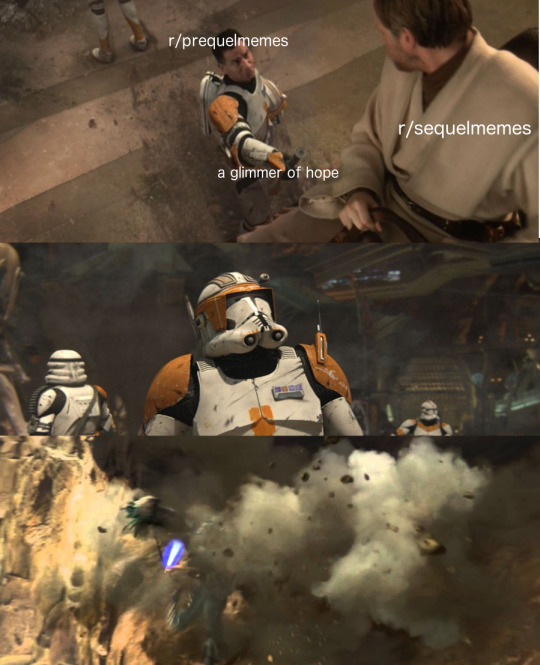
Cody will never know peace
So I’d like to state that I won’t focus as much on the blatantly whitewashing aspect, for I believe it to be very clear by now. If you aren’t familiar with it, I highly recommend you search around tumblr and the internet, there are a lot of interesting articles and posts about it that explain things very didactically and in detail. The only thing you need to know to get this started is that even at the first seasons of Clone Wars (when the troopers still had this somewhat darker skin complexion and all) they were still a whitewashed version of Temuera Morrison (Jango’s actor). And from then, as we all know, they only got whiter and whiter till we get where we are now, in rage.
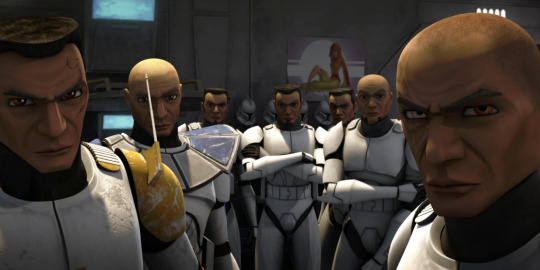
Look at this very ambiguously non-white but still westernized men fiercely guarding their pin-up space poster
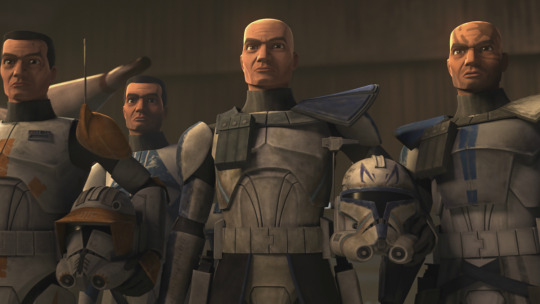
Now look at this still westernized but slightly (sarcasm) whiter men who for some reason now have different tanning levels among them (See how Rex now has a lighter skin tone? WHEN THE HELL DID THAT HAPPEN KKKKKKK) Anyway you got the idea. So without further ado...
2.1 THE FANTASY METAPHOR
As I mentioned before in Part 1, one thing that has to be very clear if you want to follow my train of thought is that it’s impossible to consume something without attributing cultural meanings to it, or without making cultural associations. This things will naturally happen and it often can improve our connection to certain narratives, especially fantastic ones. Even if a story takes place in a fantastic/sci fi universe, with all fictional species and people and worlds and cultures, they never come from nowhere, and almost always they have some or a lot of basing in real people and cultures. And when done properly, this can help making these stories resonate in a very beautifull, meaningfull way. I actually believe this intrisic cultural associations are the things that make these stories work at all. As the brilliant american speculative/science fiction author Ursula K. Le Guin says in the introduction (added in 1976) of her novel The Left Hand of Darkness, and that I was not able to chopp much because it’s absolutely genious and i’ll be leaving the link to the full text right here,
“The purpose of a thought-experiment, as the term was used by Schrodinger and other physicists, is not to predict the future — indeed Schrodinger's most famous thought-experiment goes to show that the ‘future,’ on the quantum level, cannot be predicted — but to describe reality, the present world.
Science fiction is not predictive; it is descriptive.”
[...] “Fiction writers, at least in their braver moments, do desire the truth: to know it, speak it, serve it. But they go about it in a peculiar and devious way, which consists in inventing persons, places, and events which never did and never will exist or occur, and telling about these fictions in detail and at length and with a great deal of emotion, and then when they are done writing down this pack of lies, they say, There! That's the truth!
They may use all kinds of facts to support their tissue of lies. They may describe the Marshalsea Prison, which was a real place, or the battle of Borodino, which really was fought, or the process of cloning, which really takes place in laboratories, or the deterioration of a personality, which is described in real textbooks of psychology; and so on. This weight of verifiable place-event-phenomenon-behavior makes the reader forget that he is reading a pure invention, a history that never took place anywhere but in that unlocalisable region, the author's mind. In fact, while we read a novel, we are insane —bonkers. We believe in the existence of people who aren't there, we hear their voices, we watch the battle of Borodino with them, we may even become Napoleon. Sanity returns (in most cases) when the book is closed.”
[...] “ In reading a novel, any novel, we have to know perfectly well that the whole thing is nonsense, and then, while reading, believe every word of it. Finally, when we're done with it, we may find — if it's a good novel — that we're a bit different from what we were before we read it, that we have been changed a little, as if by having met a new face, crossed a street we never crossed before. But it's very hard to say just what we learned, how we were changed.
The artist deals with what cannot be said in words.
The artist whose medium is fiction does this within words. The novelist says in words what cannot be said in words. Words can be used thus paradoxically because they have, along with a semiotic usage, a symbolic or metaphoric usage. [...] All fiction is metaphor. Science fiction is metaphor. What sets it apart from older forms of fiction seems to be its use of new metaphors, drawn from certain great dominants of our contemporary life — science, all the sciences, and technology, and the relativistic and the historical outlook, among them. Space travel is one of these metaphors; so is an alternative society, an alternative biology; the future is another. The future, in fiction, is a metaphor.
A metaphor for what?” [1]
A metaphor for what indeed. I won’t be going into what Star Wars as a whole is a metaphor for, because I am certain that it varies from person to person, and everyone can and has the total right to take whatever they want from this story, and understand it as they see fit. That’s why it’s called the modern myth. And therefore, all I’ll be saying here is playinly my take not only on what I understand the Clones to be, but what I believe they could have meant.
2.2 SO, BOBA IS A CLONE
I don’t want to get too repetitive, but I wanted to adress it because even though I by no means intend to put Boba and the Clones in the same bag, there is one aspect about them that I find very similar and interesting, that is the persue of individuality. While the Clones have this very intrinsically connected to their narratives, in Boba’s case this appears more in his concept design. As I mentioned in Part 1, one of the things the CW staff had in mind while designing the mandalorians is that they wanted to make Boba seem unique and distinguishable from them, and honestly even in the original trilogy he stands out a lot. He is unique and memorable and that’s one of the things that draws us to him.
And as we all know, both Boba and Jango and the Clones are played by Temuera Morrison — and occasionally by the wonderful Bodie Taylor and Daniel Logan. And Temuera Morrison comes from the Maori people. And differently from the mandalorian case, where we were talking about a whole planet, in this situation we’re talking about portraying one single person, so there’s nowhere to go around his appearance and phenotypes, right? I mean, you are literally representing an actual individual, so there’s no way you could alter their looks, right?
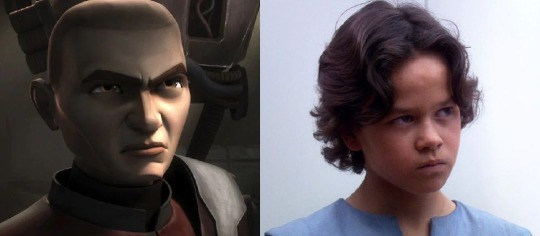
(hahahaha wrong)
And besides that, I think that is in situations like that (when we are talking about individuals) that the actor’s perspective could really have a place to shine (just the same as how Lea was mostly written by Carrie Fisher). In this very heart-warming interview for The New York Times (which you can read full signing up for their 5-free-articles-per-month policy), Temuera Morrison talks a little bit about how he incorporated his cultural background to Boba Fett in The Mandalorian:
“I come from the Maori nation of New Zealand, the Indigenous people — we’re the Down Under Polynesians — and I wanted to bring that kind of spirit and energy, which we call wairua. I’ve been trained in my cultural dance, which we call the haka. I’ve also been trained in some of our weapons, so that’s how I was able to manipulate some of the weapons in my fight scenes and work with the gaffi stick, which my character has.” [2]
The Gaffi stick (or Gaderffii), btw, is the weapon used by the Tusken Raiders on Tatooine, and according to oceanic art expert Bruno Claessens it’s design was inspired by wooden Fijian war clubs called totokia. [3]
And I think is very clear how this background can influence one’s performance and approach to a character, and majorly how much more alive this character will feel like. Beyond that, having an actor from your culture to play and add elements to a character will higly improve your sense of connection with them (besides all the impact of seeying yourself on screen, and seeying yourself portrayed with respect). It would only make sense if the cultural elements that the actor brought when giving life to a fictional individual would’ve been kept and even deepened while expanding this role. And if you’re familiar with Star Wars Legends you’ll probably rememeber that in Legends Jango would train and raise all Clone troopers in the Mandalorian culture, so that the Clones would sing traditional war chants before battles, be fluent in Mando’a (Mandalore’s language) and some would proudly take mandalorian names for themselves. So why didn’t Filoni Inc. take that into account when they went to delve into the clones in The Clone Wars?
2.3 THE WHITE MINORITY
First of all I’d like to state that all this is 100% me conjecturing, and by no means at all I’m saying that this is what really happened. But while I was re-watching CW before The Bad Batch premiere, something came to my mind regarding the whitewashing of the Clones, and I’d like to leave that on the table.
So, you know this kind of recent movies and series that depicted like, fairies in this fictional world where fairies were very opressed, but there would be a lot of fairies played by white actors? Just like Bright and Carnival Row. If you’ve watched some of these and have some racial conscience, you’ll probably know where I’m going here. And the issue with it is that often this medias will portray real situations of racism and opression and prejudice, but all applied to white people. Like in Carnival Row, when going to work as a maid in a rich human house, our girl Cara Delevingne had to fight not to have her braids (which held a lot of significance in her culture) cut by her intolerant human mistress, because the braids were not “appropriate”. Got it? hahahaha what a joy

Look at her ethnic braids!!!
One of the reasons this happens might be to relieve a white audience of the burden of watching these stories and feeling what I like to call “white guilt”. Because, as we all know, white people were never very oppressed. Historically speaking, white people have always been in privileged social positions, and in an exploitative relationship between two ethnic groups, white people very usually would be the exploiters — the opressors. So while watching situations (that every minority would know to be very real) of opression in fiction, if these situations were lived by a white actor, there would be no real-life associations, because we have no historical parameter to associate this situation with anything in real life — if you are white. Thus, there is less chance that, when consuming one of these narratives, whoever is watching will question the "truthfulness" of these situations (because it's not "real racism", see, "they're just fairies"). It's easier for a person to watch without having to step out of their comfort zone, or confront the reality of real people who actually go through things like that. There's even a chance that this might diminish empathy for these people.
Once again, not saying this is specifically the case of the Clones, majorly because one of the main feelings you have when watching CW is exactly empathy for the troopers (at least for me, honestly, the galaxy could explode, I just wanted those poor men to be happy for God’s sake). But I’ll talk more about it later.
The thing is, the whole thing with the Clones, if you think about it, it’s not pretty. If you step on little tiny bit outside the bubble of “fictional fantasy”, the concept is very outrageous. They are kept in conditions analogous to slavery, to say the least. To say the more, they were literally made in an on-demand lab to serve a purpose they are personally not a part of, for which they will neither receive any reward nor share any part of the gains. On the contrary, as we saw in The Bad Batch, as soon as the war was over and the clones were no longer useful as cannonballs, they were discarded. In the (wonderful) episode 6 of the third season of (the almost flawless) Rebels, “The Last Battle”, we're even personally introduced to the analogy that there really wasn't much difference in value between clones and droids, something that was pretty clear in Clone Wars but hadn't been said explicitly yet.
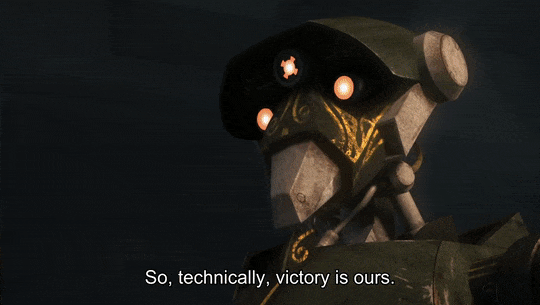
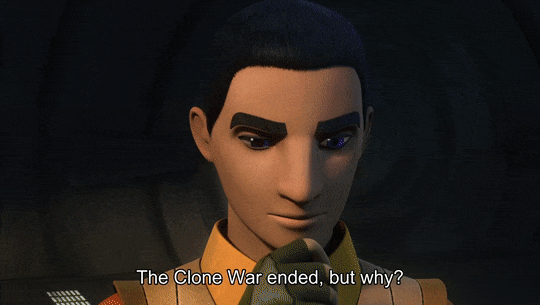
In fact, technically the Separatists can be considered to be more human than the Republic. But that's just my opinion.
So, you had this whole army of pretty much slaves. I know this is a heavy term, but these were people who were originally stripped of any sense of humanity or individuality, made literally to go to war and die in it, doing so purely in exchange for food and lodging, under the false pretense that they belonged to a glorious purpose (yes, Loki me taught that term, that was the only thing I absorbed from this series). Doing all this under extremely precarious conditions from which they had no chance of getting out, actually, getting out was tantamount to the death penalty. They were slaves. In milder terms, an oppressed minority. And again, I don't know if that was the case, but I can understand why Filoni Inc would be apprehensive about representing phenotically indigenous people in this situation. Especially since we in theory should see Anakin and Obi-Wan as the good guys.
(and here I’d like to leave a little disclaimer that I believe the whole Anakin-was-a-slave-once plot was HUGELY misused (and honestly just badly done) both in the prequels and in the animeted series — maybe for the best, since he was, you know, white and all that, and I don’t know how the writers would have handled it, but ANYWAY — I believe this could have been further explored, particularly regarding his relationship with the Clones, and how it could have influenced his revolt against the Jedi, and manipulated to add to his anger and all that. I mean, we already HAD the fact that Anakin shared a deeper conection with his troopers than usual)
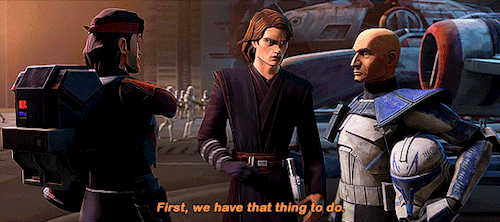

Yes, Rex, you have common trauma experiences to share. But anyway, backing to my track
As I was saying, we are to see them as good guys, and maybe that could’ve been tricky if we saw them hooping up on slavery practices. Like, idk, a “nice” sugar plantation owner? (I don’t know the correct word for it in english, but in portuguese they were called senhores de engenho) Like this guy from 12 Years a Slave?
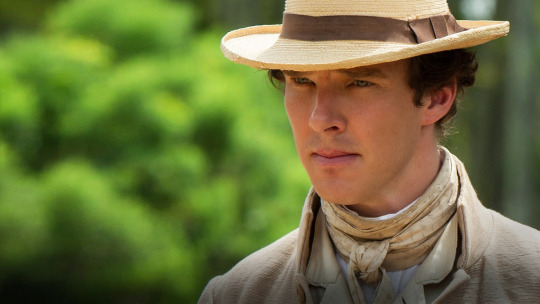
You know, the slave owner who was “nice”. IDK, anyway
No one will ever watch Clone Wars and make this association (I believe not, at least), of course not. But if we were to see how CW deepened the clone arcs, and see them as phenotypically indigenous, subjected to certain situations that occur in CW (yes, like Umbara), maybe some kind of association would’ve been easier to make.
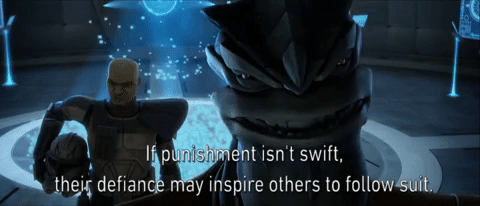
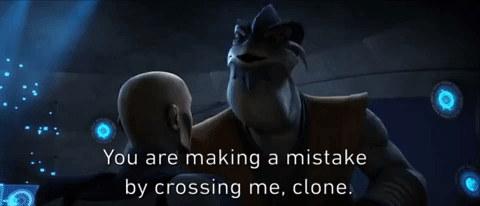
I mean, come onnnn I can’t be the only one seeing it
You see, maybe not the whole 12 Years a Slave association one, but I don’t think it’s hard to see there was something there. And maybe this could’ve been even more evident if they looked non-white. Because historically, both black peoples and indigenous peoples went through processes of slavery, from which we as a society are still impacted today. And to slave a people, the first thing you have to do is strip them from their humanity. So it might be easier to see this situation and apply it to real life. And maybe that could lead to a whole lot of other questions regarding the Clones, the Republic, the Jedi, and even how chill Obi-Wan was about all this. We might come out of it, as lady Ursula Le Guin stated in the fragment above, a bit different from what we were before we watch it.
Maybe even unconsciously, Filoni Inc thought we would be more confortable watching if they just looked white (and because of colonialism and all that, but I’m adding thoughts here).
And of course I don’t like the idea of, idk, looking at Obi-Wan and thinking about Benedict Cumberbatch in 12 Years a Slave or something like that. Of course that, if the Clones were to play the same role as they did in the prequels, to obediently serve the Jedi and quietly die for them, that would have been bad, and hurtfull, and pejorative if added to all that I said here. But the thing is that Clone Wars, consciously or not, already solved that. At least to my point of view, they already managed to approach this situation in an incredible competent way, that is giving them agency.
2.4 AGENCY AND INDIVIDUALITY
So, one of the things I love most in Clone Wars is how it really feels like it’s about the Clones. Like, we have the bigger scene of Palpatine taking over, Ahsoka’s growth arc, Anakin’s turn to The Dark Side, the dawn of the Jedi and rise of the Empire and all that, but it also has this idk, vibe, of there’s actually something going on that no one in scene is talking about? And this something is the Clones. We have these episodes spread throughout the seasons, even out of chronological order, which when watched together tell a parallel story to the war, to everything I mentioned. Which is a story about individuals. Clone Wars manages to, in a (at least to me) very touching way, make the Clones be the heros.

Can you really look me in the eye and say that Five’s story didn’t CRASH you like a full-speed train???? He may not have the same amount of screen-time as the protagonists, but his story is just as important as theirs (and to me, it might be the most meaningful one). Because he is the first to break free from the opression cicle all the Clones were trapped into.

His story can be divided into 6 phases.
1 - First, the construction of his individuality, in other words, the reclaiming of his humanity.
2 - Then the assimilation of understanding yourself as an individual of value, and then extending this to all his brothers, not as a unit, but as a set of individuals collectively having this same newly discovered value.
3 - This makes him realize that in the situation they find themselves in, they are not being recognized as such. This makes him question the reality of their situation.
4 - Freed from the illusion of his state, he seeks the truth about it.
5 - This then leads him to seek liberation not just for himself, but for all the Clones (it's basically Plato's Cave, and I'm not exaggerating here).
6 - And finally, precisely because he has assimilated his individuality and sought freedom for himself and his brothers, he is punished for it.
His story is all about agency. Agency, according to the Wikipedia page that is the first to appear if you type “agency” on Google, is that agency is “the abstract principle that autonomous beings, agents, are capable of acting by themselves” [4], and this abstract principle can be dissected in 7 segments:
Law - a person acting on behalf of another person
Religious - "the privilege of choice... introduced by God"
Moral - capacity for making moral judgments
Philosophical - the capacity of an autonomous agent to act, relating to action theory in philosophy
Psychological - the ability to recognize or attribute agency in humans and non-human animals
Sociological - the ability of social actors to make independent choices, relating to action theory in sociology
Structural - ability of an individual to organize future situations and resource distribution
All of them apply here. And this is just the story of one Clone. We know there are many others throughout the series.
Agency is what can make the world of a difference when you are telling a story about an opressed minority. Because opressed minorities do exist, and opression exists, and if you are insecure about consuming a fictional media about opressed minorities, see if they have agency might be a good place to start. So that’s why I think that everything I said before in 2.3 falls short. Because the solution already existed, and was indeed done. Honestly, making the non-agency representation of the Clones (the one we see in the prequels) to be the one played by Temuera Morrison, and then giving them agency in the version where they appear to be white, just leaves a bitter taste in my mouth.
And honestly, if they were to make the Clones look like Temuera Morrison, and by that mean, take more inspiration in the Māori culture, maybe they wouldn’t even have to change much of their representation besides their facial features. As I said in part 1, I am not by any means an expert in polynesian cultures, but there was something that really got me while I was researching about it. And is the facial tattoos. More precisely, the tā moko.
2.5 T�� MOKO
Once again I’ll be using the Te Ara: The Encyclopedia of New Zealand as source, and you can find the articles used linked at the end of this post.
Etymologically speaking,
“The term moko traditionally applied to male facial tattooing, while kauae referred to moko on the chins of women. There were other specific terms for tattooing on other parts of the body. Eventually ‘moko’ came to be used for Māori tattooing in general.” [5]
So moko is the correct name for the characteristic tattoos we often see when we look for Māori culture.
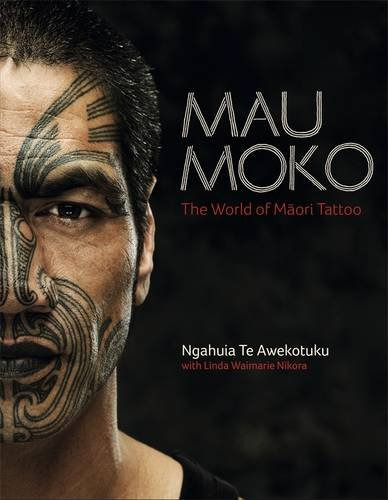
These ones ^. Please also look this book up, it’s beautiful. It’s written by Ngahuia Te Awekotuku, a New Zealand academic specialising in Māori cultural issues and a lesbian activist. She’s wonderful.
According to the Tourism NewZealand website,
“In Māori culture, it [moko] reflects the individual's whakapapa (ancestry) and personal history. In earlier times it was an important signifier of social rank, knowledge, skill and eligibility to marry.”
“Traditionally men received moko on their faces, buttocks and thighs. Māori face tattoos are the ultimate expression of Māori identity. Māori believe the head is the most sacred part of the body, so facial tattoos have special significance.”
[...] “The main lines in a Māori tattoo are called manawa, which is the Māori word for heart.” [6]
Therefore, in the Māori culture, there’s this incredibly deep meaning attributed to the (specific of their culture) tattooing of the face. The act of tattooing the body, any part of the body, is incredibly powerful in many cultures around the globe. The adornment of the body can have different meanings for these different cultures, but all of which I've come into contact with do mean a lot. It’s one of the oldest and most beautiful human expressions of individuality and identity.
And in the Star Wars universe, the Clones are the group that has the deeper connection to, and the best narrative regarding, tattoos. In fact, besides Hera’s father, Cham Syndulla, the Clones are the only individuals to have tattooed skin, at least that I can recall of. And they do share a deep connection to it.
For the Clones, the tattoos (added to hairstyles) are the most meaningful way in which they can express themselves. Is what makes them distinguishable from each other to other people. Tattoos are one of the things that represent them as individuals.
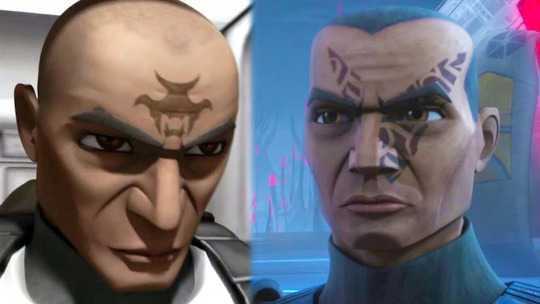
And I’m not BY ANY MEANS sayin that the Clones facial tattoos = Moko. That’s not my point. But that’s one of the things I meant when I said earlier about the wasted potential of the representation of the Clones (in my point of view). Because maybe if it were their intention to base the culture of the clones after the polynesian culture, maybe if it were their intention to make the Clones actually look like Temuera Morrison, this could have meant a whole deal. More than it’d appear looking to it from outside this culture. Maybe if there were actual polynesian people in the team that designed the Clones and wrote them (or at least indigenous people, something), who knows what we could’ve had.
Even in Hunter’s design, I noticed that if you take for example this frame of Temuera from the movie River Queen (2005), where we can have a closer look at the design of his tā moko
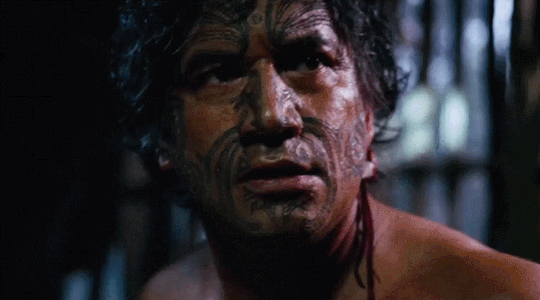
Speaking purely plastically (because I don’t want to get into the movie itself, just using it as example because then I can use Temuera himself as a comparison), see the lines around the contours of his mouth? Now look at Hunter’s.

I find it interesting that they choose to design this lines coming from around his nose like that. But at this point I am stretching A LOT into plastic and semiotics, so this comparison is just a little thing that got my attention. I know that his tattoo is a skull and etc etc, I’m just poiting this out. And it even makes me a little frustrated, because they could have taken so many interesting paths in the Bad Batch designs. But instead they choose to pay homage to Rambo. And I mean, I like Rambo, I think he’s cool and all that.
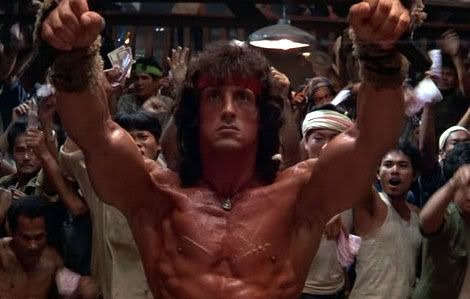
Look at him doing Filipino martial arts
But then, as we say in Brasil, they had the knife and the cheese in their hands (all they had to do was cut the cheese, but they didn’t). Istead, it seems like in order to make Hunter look like Rambo, they made him even whiter???
2.6 SO...
Look, I love The Clone Wars. I’m crazy about it. I love the Clones, I love their stories and plots. They are great characters and one of the greatest addings ever made in the Star Wars universe. They even have, in my opinion, the best soundtrack piece to feature in a Star Wars media since John Williams’ wonderful score. It just feels to me as if their narrative core is full of bagage, and meanings, and associations that were just wiped under the carpet when they suddenly became white. It just feels to me as if, once again, they were trying to erase the person behing the trooper mask, and the people they were to represent, and the history they should evoke.
I don’t know why they were whitewashed. Maybe it was just the old due racism and colonialism. Maybe it was meant for us to not question the Jedi, or our good guys, or the real morality of this fictional universe where we were immersed. But then, was it meant for what?
The Clones were a metaphor for what?

(spoiler: the answer still contains colonialism)
Thank you so much for reading !!!! (and congratulations for getting this far, you are a true hero)
SOURCES USED IN THIS:
[1] Ursulla K. Le Guin, 'The Left Hand of Darkness', 14th ACE print run of June, 1977
[2] Dave Itzkoff, 'Being Boba Fett: Temuera Morrison Discusses ‘The Mandalorian’', The New York Times, published Dec. 7, 2020, https://www.nytimes.com/2020/12/07/arts/television/the-mandalorian-boba-fett-temuera-morrison.html (accessed 15 September 2021)
[3] Bruno Claessens, 'George Lucas' "Star Wars" and Oceanic art' , Archived from the original on December 5, 2020, https://web.archive.org/web/20201205114353/http://brunoclaessens.com/2015/07/george-lucas-star-wars-and-oceanic-art/#.YEiJ-p37RhF (accessed 15 September 2021)
[4] Wikipedia contributors, "Agency," Wikipedia, The Free Encyclopedia, https://en.wikipedia.org/w/index.php?title=Agency&oldid=1037924611 (accessed September 17, 2021)
[5] Rawinia Higgins, 'Tā moko – Māori tattooing - Origins of tā moko', Te Ara - the Encyclopedia of New Zealand, http://www.TeAra.govt.nz/en/ta-moko-maori-tattooing/page-1 (accessed 17 September 2021)
[6] Tourism New Zealand, ‘The meaning of tā moko, traditional Māori tattoos’, The Tourism New Zealand website, https://www.newzealand.com/us/feature/ta-moko-maori-tattoo/ (accessed 17 September 2021)
#THE CLONES DESERVED BETTER WE ALL KNOW IT#star wars#star wars animated series#the bad batch#clone troopers#tbb#mandalorian#colonialism#whitewashing#UnwhitewashTBB#semiotics#visual culture#cw#the clone wars#star wars the clone wars#rex#hunter#the bad batch hunter#dave filoni#temuera morrison#maori culture#moko#anakin skywalker#star wars rebels#obi wan#capitan rex#cody
27 notes
·
View notes
Text
Top 10 Favorite Young Justice Characters
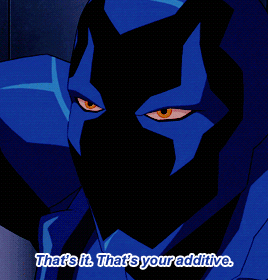
10. Jaime Reyes/Blue Beetle
Starting off the list is Blue Beetle. Young Justice introduced me to him, and I was hooked. He’s probably the most mellow and calming voice. His arc and relationship with Bart (friendship or not) were my favorite aspects of S2. They bounced off each other in every scene. I was very disappointed when Jaime and Bart were sidelined so much, and hope S4 changes this (particularly with Bart).
Jaime in the number 10 spot since he doesn’t really have much of a memorable personality. Still love him to bits though.

9. Will Harper/Red Arrow
Funny enough, I did not like Will. He was an asshole in S1; S2 kind of changed my mind about him but not enough since he didn’t appear as much. What really changed my mind was the episode “Private Security” (S3 Ep.4). I started looking back into Will’s storylines and, I have to admit, his is probably one of the best character development.
The first season had him unwillingly living a lie and betraying the people he cared for. In season 2 he was so consumed into finding the original Roy for five years, not even caring or focusing about his own life. I felt really bad for Will because he was probably going through an identity crisis and thought he couldn’t live his life without finding Arsenal. Probably felt guilty.
Seeing him living his own life and being happy with his daughter was so heartwarming. I smiled every time Will appeared in the latest season (totally ignoring the Will x Artemis fiasco), especially with Lian. I’m very proud of him.
I feel bad for putting him so low, yet I adore the next characters more.
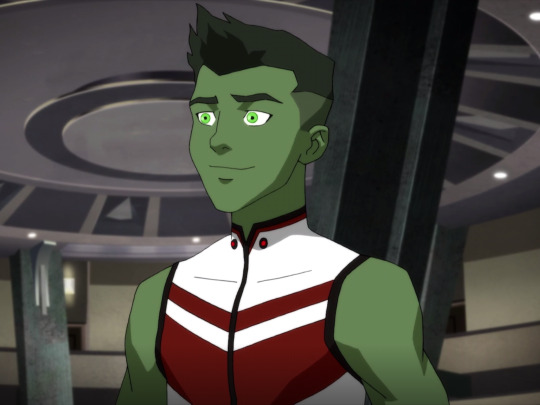
8. Garfield Logan/Beast Boy
I have been a massive Beast Boy fan since Teen Titans so you probably can imagine how excited to see him. His origin story was unique and his brother-sister bond with M’gann was very sweet. It was pretty weird seeing how much younger Gar was than Dick, but I got used to it. I was bummed that Gar wasn’t in S2 as much; however, S3 truly made up for it.
After watching Beast Boy being a great leader in S5 of Teen Titans, I wanted a leader-like and more mature version of him. Young Justice truly delivered with Gar being the leader of the Outsiders. It’s nice to see him treated with respect rather than as a joke because that was my biggest gripe with Teen Titans. Though it was weird seeing him not crack a joke at all.
Gar’s story with his mom was heartbreaking to see. I literally cried seeing his reaction to revisiting his trauma in S2 and S3; I just wanted to hug and tell him how awesome he is. My only complaint with Gar in S3 was that the Outsiders weren’t established until near the end of the season.
His voice actor being Greg Cipes also gives him extra points (He’s a chill guy and radiates BB energy).

7. Dick Grayson/Nightwing/ Robin I
Sorry to all the hardcore Nightwing fans.
I love Dick (don’t get any ideas), but he doesn’t get enough development in the spotlight. One of the things I really wanted to see from him is his growth as a main leader, and his journey to becoming Nightwing. I was really bummed when these happened between the first two seasons.
To be honest, I don’t have as much to say about him other than straightforward qualities I enjoy about him.
1.His Voice (it’s so soothing)
2.His Personality (very charismatic)
3.Very Handsome (Probably in the top 3 my most handsome YJ Men list)
I put him higher than the others since he made a lot of contribution to the story and his new words (gotta love that aster!)
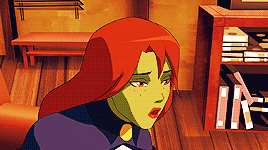
6. Megan Morse/M’gann M’orzz/Miss Martian
If I made this list during S1, M’gann would have probably been in my top 3 (maybe even No. 1), but S2 didn’t give her any brownie points.
I really liked S1 Miss Martian because of her kind heart, awkward girl next door personality. Her trouble fitting in the beginning reminded me of when I was going through a time in high school; seeing her having trouble as well helped me feel not so lonely. M’gann powers were (still are) my favorite since I am a big fan of mind-like powers. I would feel so powerful. Watching her identity crisis(?) arc was great too. I’ve had trouble feeling comfortable in my own skin as well as my social anxiety (I’m a mess) and I could understand how scared Megan was of her friends’ thoughts on her true form.
Oh boy. Season 2 basically ruined her. Learning what she would do to enemies was terrifying to see and left me wondering what happened to Miss Martian that made her step this far. What she almost did to Superboy was almost unforgivable. You do not try to manipulate with your boyfriend’s mind when you guys have an argument! Shame on you M’gann. If Superboy hadn’t forgiven you then I wouldn’t have either.
Good thing S3 somewhat redeemed her. Her kind heart was noticeable again and she refused to do that mind trick again (thank god). Very excited for the Superboy and Miss Martian wedding! Please creators, I beg of you to not skip over it. I want to cry my eyes out in happiness!
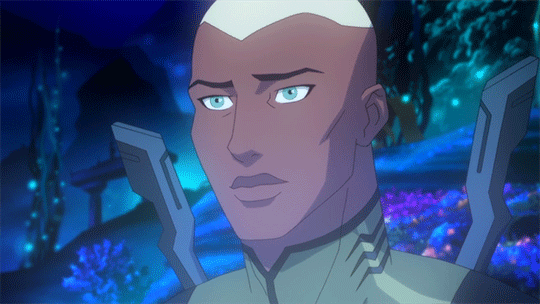
5. Kaldur’ahm/Aquaman/Aqualad
Now we’re in the top 5 with Aqualad (*ahem* Aquaman) starting it off.
Creating Kaldur was the best decision the creators ever did. I love him with all my heart!
He added diversity to the original team and was a great leader. S1 was not his breakout season, though the second season definitely was.
Kladur played the villain so well that he deserves an automatic Oscar. I never doubted that he was with the heroes, but he didn’t disappoint. My favorite part about Aqualad’s performance was when he rose from the ocean slowly like a cliché villain (he made it work), and the line he said right after he “killed” Artemis; it sent me chills. Love it!
Pretty disappointed that he didn’t appear as much in S3. Very happy that he is a part of the LGBTQ+ community and is in a happy relationship. I’m a part of the community and loved that there was finally some representation in one of my favorite shows. Even so, I have to criticize how rushed and sidelined it was. I hope Kaldur and Wyynde’s relationship gets development.
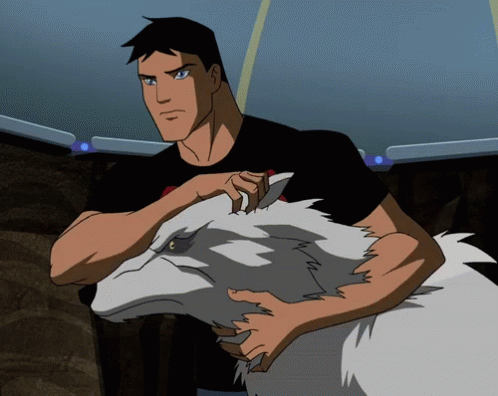
4. Kon-El/Conner Kent/Superboy
Like Will, I did not like Superboy at first. Mainly angry and volatile characters were never really my cup of tea. I do understand why he was upset and felt bad for him; I just handle anger the direct opposite as him. My love for Conner started growing around the end of S1. He was very sweet towards Miss Martian (bless him for not caring about her appearance) and his anger was in control.
Season 2 pretty much switched my opinions on him and M’gann. It was awful what M’gann almost did to him. That scene with him being so sad that what she did ruined that special bond they had almost made me cry. I wanted to give him a hug. He grew so much too since I don’t think he would have handled the whole M’gann drama as well in S1. A lot of furniture would’ve been broken.
I gotta admit something. I almost put Conner near the bottom (maybe no. 7). A comment in a poll in Amino changed my mind. I wrote a poll asking other fans who did they prefer SB or MM. At that point I said SB, though I didn’t think much of it. Someone (specifically yjfangirl) responded “Superboy has the best development in the show.” This had me thinking about how far SB has gone. In the beginning, Conner was an angry guy who felt alone and rejected by the person who he was meant to emulate. Now he is happier and living for himself rather than to be the next Superman. He’s getting married people! A little detail I noticed when rewatching S3 was Superboy mentioning to new characters that they weren’t obligated to be a hero because of their abilities. I adored this! The main reason why Superboy was created to be Superman if the original ever died, and another one of Luthor’s puppets. But he strayed from that pressuring path and is doing his own thing. Conner doesn’t want other people to feel like he did. What an absolute pure soul.
Also, yjfangirl, first I want to say Hi (*waves*)! Then say thanks for writing that comment. It made me really think about the bigger picture with SB and my love for him as grown exponentially. You probably didn’t mean to do that, but I still want to thank you. 😊
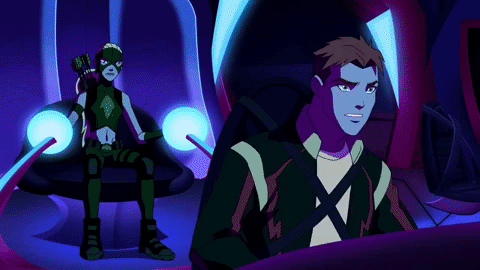
3.Wally West/Kid Flash
We’re in the elites now.
I don’t know how to explain it, I just love Wally. He makes me laugh, and his character growth was great. At first, Wally was this cocky flirt who didn’t take the hero work as seriously. That changed in “Cold-hearted,” one of my favorite episodes in the series. This was when I really started seeing more of Wally than being this dumb flirt. It was great seeing him actually caring about helping people since I believed for a long time that he wanted to be a superhero to just have powers rather than actually protect others. The regret in his eyes when he thought his impulsive behavior killed Perdita helped me see who he really was- this somewhat arrogant speedster who had a kind heart. Episodes that can make me change my perspective on characters are truly special.
I was very upset that he wasn’t in S2 a lot. I understand why since he gave up the life, but I was still bummed. Seeing him being so loving and protective towards Artemis was amazing. Spitfire is my favorite ship and I will not give up on them. All I want is a happy ending! The penultimate episode of S3 was a hint that it will happen. Watching the S2 finale was heartbreaking, I cried watching him disappear, his love for Artemis being the last things he said. Artemis’ reaction did not(I just wanted to hug her).
I have more to say, though I’m leaving it for another post. 😉
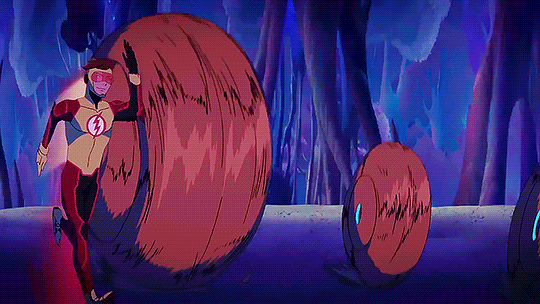
2.Bart Allen/Kid Flash II/Impulse
Picking between Bart and Wally for second place was tough. Took me a while to decide; I’ll talk about it later on.
The moment Bart made his appearance, I absolutely adored him. He is amazing and I live for his hyper, fun attitude. His arc and relationship with Jaime were my favorite aspects of S2. What can I say, their chemistry is great to see.
That scene when he was meeting the Flash family was so adorable. His excitement was infectious and spoiling his dad and aunt’s births was hilarious! I watch it occasionally whenever I need a good laugh or reason to smile.
Unlike most time travelers- at least the ones I’ve seen- Bart was very involved with what was going on and befriended his biggest enemy- evil and weirdly huge future Blue Beetle. He was pretty careful about disclosing very important information and took things very seriously. You never know if disclosing everything was the thing that brought the world to chaos.
What I found interesting was his choice on how to interact with everyone. He seemed pretty gloomy in the future, but decided to portray this cheerful, devil-may-care attitude to be more likable. I understood (still kind of do). I had terrible mental health issues and I pretended to be happy in front of loved ones because I thought they wouldn’t care about me anymore. Bart got some brownie points for that.
I was dissatisfied when his role was greatly reduced. I wanted the creators to go further with Bart by revealing his past and how it affected him. He was pretty much comedy relief. You couldn’t imagine how disappointed I was, especially with it involving my second favorite character. Season 4 better change that.
I know that you shouldn’t assume a character’s sexuality, yet I really hope Bart is gay. There needs to be more clear representation and Bart can be one of them. I’m also a Bluepulse and Bartuado shipper (fine with either one as long as Bart’s bond with each of them stays strong).
Anyway, I mentioned that I would explain why I chose Bart for 2nd place over Wally. It mostly stems from wishful thinking. I really want S4 to have Bart as a main character since I believe the future will be strong plot point in the season. Development could surely happen such as Bart opening up more about what he went through. Let all those feelings go.
I’m going to write an article on my hopes for S4 when a release date is announced. Bart and Wally will most definitely be talked about.
…..
We are finally near the end!
And my No. 1 favorite character is…
Drumroll please!
…
..
.
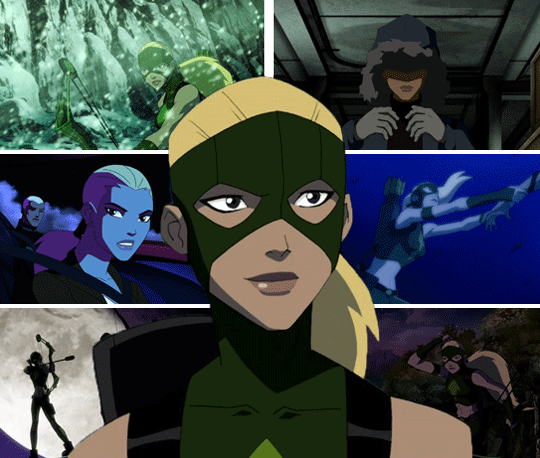
1.Artemis Crock/Tigress/Artemis
That’s right people!
Artemis Crock, original member of the Team and daughter of villains!
She is such an inspiration to anyone who wants to go their own past without their parents’ support.
It’s hard to describe how much I love Artemis. She’s brave, strong-willed, and a kind person. It’s crazy how great of a person she is after all the terrible things that happened to her. I look up to her because I don’t have a healthy relationship with my parents (verbal and mental abuse) and there are times I don’t feel strong enough to stand on my own. I want to carry the amount of strength Artemis has as my own.
After all that happened in S2, it was amazing to see Artemis come back to the team and train the new generation. It must have been hard to walk away from a safe, comfortable life for a chaotic, dangerous life. I admire that in everyone, but I hold more respect for Artemis since “the life” “killed” Wally. I wanted to hug her so bad.
She’s also one of the kindest people in the show, the events in S3 being the best example. When Zatanna was crying about her dad, Artemis was there to comfort her. It was so sweet! Roy and her also took in Halo and Terra like they were a part of the family; the archer treated them like the best big sister. That rainstorm scene was heartwarming to the core.
Wouldn’t Artemis be an amazing mother? Lian and her have a strong bond like a mother and daughter; I loved it, and Lian is in good hands with Roy and Artemis. Though Jade deserves a chance to be a mother. Artemis also seemed to enjoy taking care of those kids in that S1 episode. Wally too. You guys know what I’m guys insinuating. 😉
Get ready for some fanfics on that someday.
My favorite Artemis-centered episode was the second to last episode of S3. I was waiting for this episode centering around Artemis missing Wally and learning to move on. It was great yet heartbreaking. Nothing bad happened. That Will and Artemis kiss never happened. Everyone makes a mistake. No matter how terrible it was.
Anyway, seeing Artemis and Wally living their lives and having a baby gave me life, even if it was fake. It was a vision of the future. I will believe this until there is confirmation that Wally will not come back.
Did anyone else cry when Artemis was so desperate to, but Wally wouldn’t let that happen (the real Wally would do that)? They are a great example of a healthy relationship with all the love and support they have for each other. I want that.
#artemis young justice#artemis crock#wally x artemis#bart allen#impulse#Wally West#kid flash#Superboy#bluepulse#bartuardo#top 10 list#top 10 favorites#top 10#kaldur#kaldur'ahm#aqualad#conner kent#kon el#kaldur x wyynde#miss martian#M'gann M'orzz#megan morse#dick grayson#nightwing#garfield logan#beast boy#young justice outsiders#young justice cartoon#Young Justice#red arrow
163 notes
·
View notes
Text
Leverage Season 2, Episode 13, The Future Job, Audio Commentary Transcript
Marc: Hello, Marc Roskin, producer and director of this episode.
Amy: Hi, Amy Berg, supervising producer and co-writer of this episode.
John: John Rogers, executive producer.
Chris: Chris Downy, executive producer, and co-writer of the Future Job.
John: Uh, this, did this start out of the haunting episode? Is this how the psychic came about?
Amy: The origin of this? No, the um, no I don't think so. Psychic Job was—
John: Was that Dean's?
Amy: No, it was literally a card that was on my board at the beginning of the season, along with Three Days of the Hunter, and Two Live Crew Job, so this was essentially plucked from the well.
John: This was one of the ones that sat there, that sat there for a long time, she was great, what, uh...
Marc: Jen Taylor, local Seattle actress. She was wonderful.
John: But it was Dean who really dug in on this one, because he really liked the bad guy. He really said, you know, ‘I really wanna hammer the fake psychics.’
Amy: Yeah, and he was the one who, sort of, had the vision of, sort of, making this a Parker episode and, sort of, getting to delve deeper into her backstory a little bit.
Chris: And there's Luke Perry.
John: Luke Perry was fantastic.
Amy: He was great.
John: How did we wind up casting Luke Perry?
Chris: I think it was suggested by our casting folks, and I think it was the first one on his list, and he said, Luke Perry would be fantastic for this role. And we all, we were kind of like wow. You know, you didn't really think of him as- as an evil psychic.
Marc: I would leave my wife for Luke Perry.
[All Laugh]
John: Luke Perry—uh, as a director, why don't you talk about working with Luke Perry, Marc?
Marc: He was wonderful. I mean, you can just really, when someone has that much experience working in television, I mean, it's amazing. He was on time, he never left set, he was always talking about character and would take any suggestions, you know, from me as a director, if you wanted to go another way, just let me know; he was just a dream to work with.
John: Now, what was the idea on this particular setting for the psychic, instead of like a formal office, or like, what was the set dec idea on this?
Marc: Well we wanted to have him working out of, like, a home type office, and actually we had to find something that we could build on the stage to work on.
John: Oh so that wasn't a location, that was-
Marc: No, that was just our basic, uh, hospital and Gina apartment set.
John: [Laughs] The Frankenset.
Marc: Shot on the same day as this day, on the stage, in our bar.
John: Okay, cool. Nice shot through the glass, by the way. I didn't know those taps worked. If I'd known those taps worked I would have been up north a lot more often.
Marc: They work. As soon as you request it, Eric Bates we'll start pumping a keg through them.
John: And this actor playing the brother—
Marc: Uh, Eric Riedman, he was great, too. I mean, he really, really clicked with Tim in this scene. They really worked well together.
John: And it was interesting. We were trying to figure out—we had a great victim, but ordinarily our victim has already had the thing done to them, but in the design of this, you needed the victim to sort of be in suspension.
Amy: Yeah, we needed a proxy. And uh, the brother was sort of a great emotional investment tool for us.
John: Yeah. And Portland actor, just a really, really great job. That was a good, 'I hate that guy moment', when we made her pregnant. And uh—
Chris: And taking her house.
John: Take her house, don't leave money on the table.
Amy: I guess we should point out that, uh, I named a lot of these characters - with the exception of Dalton Rand, Luke Perry's character - after the assistants on our show.
John: Oh, this one is the one where we used all the—
Amy: Yeah, it's Wilson, it's Nicholas, and Ryan, and—
Chris: I love that logo there, by the way, that went by.
John: Oh yeah, who designed that? The great Dalton Rand logo?
Chris: Oh they did a great job.
John: It was actually designed by Derek, right? Our computer graphics guy?
Marc: Yeah, Derek Frederickson in Chicago.
John: He banged it up for us. And it is amazing, this is another one where you could assume we are doing one or the other of any of the very sundry famous psychics, but really they all use the same cons.
Amy: Yeah, they really do.
John: And I’ll also say, Derren Brown was a big influence on this episode.
Amy: Yeah, I think you and I are maybe a little too obsessed with Derren Brown, and uh—
John: He is dreamy.
Amy: He's dreamy and he's sort of an—
John: And a powerful, commanding presence.
Amy: And he's an expert in NLP, which a lot of the stuff we talk about in this episode is, and he debunks a lot of psychics and mediums and things of that sort.
John: That's a really interesting way, too, by doing shows that make it look like he has those abilities.
Amy: And Apollo Robbins, our consultant, was helpful in, sort of, submitting some great terminology for us to use throughout.
John: Oh yeah, that's right, the cold reading terminology, yeah. Um, now this, where was this set?
Marc: This was an actual cable access station that they, again, just opened the doors for us. We didn't have to change any of the logos or the numbers, the people working the camera are the actual camera crew—
Chris: Wow, that's great.
Marc: —of this station, they were wonderful.
Amy: They absorbed us into their own productions.
Chris: Just like Three Days of the Hunter, this is another example of Portland opening its doors to us.
Marc: So all those monitors, they had up and running and feeding through our system as well, it was great.
John: Now did you take a look at any of the extant shows, in order to, sort of, see how this works?
Marc: Uh, I did, and a lot of it at first was just to see the set. And everybody—once you start looking at their sets—were like 'oh, maybe ours is a little too pretty.' [All Laugh] Some of them were just like two chairs and an easel, with something leaning against it.
John: 'I'm gonna sketch what your dead mother is saying.'
Marc: And then our construction crew, you know, built the risers, so we can have some depth with the audience. This was a fun scene. It wasn't supposed to be a physical scene, but Eliot and Lathrop turned it into one, so it was kinda fun.
Chris: I love when he gets mad here.
Amy: This was supposed to be a con, and then it turned into something altogether different.
John: He's just really annoyed at that dude up in his face. And you know what's interesting is we- it was a little weird developing this, because all the tricks that a lot of fake psychics use—not the real psychics, of course, with giant lawyers behind them, but the fake psychics use—are actually techniques we use in the cons, and so it was kind of this weirdly recursive thing. It's like, we're kind of exposing to the audience how they do this, but we do it every week.
Amy: Yeah, we're exposing ourselves as much as we're exposing Dalton Rand here.
John: And this is where he goes into cold reading. What was the—and it's interesting, cold reading is a fascinating subject, there's actually a couple great books that Apollo Robbins hunted up, and the idea that just by playing the numbers, just by playing the odds, any one of these guys can hit at about 80 to 85 percent success rate.
Amy: Yeah, it's act- it's basically asking a series of questions, and, sort of, gauging reactions to people without knowing anything about them in advance. Whereas hot reads or warm reads, as they’re sometimes called, are basically doing your homework beforehand, and getting research on the people you're about to meet with and, sort of, using that knowledge to, sort of, manipulate them.
Chris: The hot read is really more what our guy's doing, which is kinda how this thing broke down in the episode, was when we hijack and sort of take it over and hot read.
Amy: Yeah. Well we, the team basically underestimates Dalton here, and he surprises them.
John: They think that once they throw him, they'll get him, and he's able to cold read Parker. Which is also a big thing, not just in anchoring Parker's story into the episode, but the show always works when the nemesis is a bit more formidable.
Amy: Absolutely.
John: And it was kind of important, especially since Luke's kind of a really nice, he's got a nice guy vibe, it was kinda really important to start to hammer in on the fact that this guy is as good as they are. If he knew they were coming, this would be a very different game.
Amy: And I think Tim is great in this scene, because he's playing the audience, he's like, ‘Wait a minute, like, we were supposed to come in and sort of take over this guy, and he's sort of manipulating Parker, and surprising me in turn.’
John: Wow, look at Beth there. She is working.
Chris: Now, how'd you work with her on this when you went into this scene?
Marc: Um, it was interesting, because the scenes we shot first are the scenes later where it was really emotional in the Leverage apartment, where she really broke down, so she was already at that place once, and she just brought it right back, and I think Luke worked really well with her.
John: I also like that beat in the van where Jeri sort of chose, it was a very nice choice, where Aldis has got Hardison really pissed off, and Jeri's just admiring the craft. She's not as emotionally invested in the team, so she can kind of step back and admire this guy's chops.
Marc: And this scene was just such a great scene where all of our actors work so well together in, not only just rehearsing it, but getting Beth to a certain place, you know, where she should be, they were all really emotionally involved in this, and took a lot of time to rehearse—
John: Probably took twice as long as we usually do to shoot this stuff.
Amy: Well yeah, it was the characters being really protective of Parker, and the actors being really protective of Beth, it was really great.
Chris: Well I think it was actually, when it was written, more angry. You know what I mean? And I think seeing the dailies, it was, like, she took it to this incredibly vulnerable place that I don't think it really was on the page.
John: Also big credit to Dean Devlin, because he also had pushed that.
Marc: He did, he did. And this was a great scene, we have all the emotional arc with Beth, but as you guys were just explaining, in the script we explain the hot read and the cold read and we break it all down.
John: Yeah, and this is—again, we are always agonizing over how to explain this stuff, and having someone with a specific emotional response or attitude in the scenes makes a giant difference. And having it be Parker, who the audience is very very fond of, really helps, you know. We're now dumping an enormous amount of exposition on your plate, and you don't care.
Chris: Right, because it's—you know, we're seeing her in this really, just devastated place.
Marc: And we just found out a lot about her past that we didn't know about.
John: And he—I love that look up, just like, ‘Help me out here, I got nothing.’
Chris: Well the thing about it, and we'll talk about it when we get there, but the way she plays the scene at the end, with the brother, really was informed by all this, which was not at all on the page at all.
Marc: Right.
Chris: Like, when she hugs the victim's brother, and we'll get there, it's as if she's hugging her own brother.
John: And also it's interesting, because—oddly, it certainly wasn't intended, but it's just the way TV shows evolve—it helps, sort of, explain her relationship with Eliot and Hardison, you know. That's sort of how she fell into that rhythm, and that sort of proxy family—
Chris: It was not intended.
John: I would like to say, I'd like to say it was a sort of subconscious Alan Moore idea space.
Amy: Speak for yourself Chris, I totally did that on purpose.
John: Like two years ahead, like two years in advance?
Chris: Oh sure. That's what you're supposed to do on these commentaries—
Amy: Yes, many many years.
Chris: —you're supposed to go 'well, you see, I laid these—'
John: 'So this moment, two years earlier—'
Amy: Reason we're awesome, number 427.
John: But here's what's amazing is, we really, we're always like, in the show, could we possibly fool people with this? And then when you do this, this explanation scene, could you possibly fool anyone? They do! This is how they do it! We're not making any of this up.
Amy: No.
John: If anything, we're giving them better tech.
Amy: We're giving them ideas on how to be better at it.
Chris: And by the way, from a technical standpoint, these scenes were very difficult to shoot because we're going from monitors to action—
Amy: To flashbacks.
Chris: —to flashbacks, very hard.
Marc: And they're all green screens on the day we're shooting them.
John: Oh that's right, we didn't have the footage.
Amy: Nothing was on these monitors.
Marc: Nothing is on the monitors.
Amy: All we had was a nice bulletin board.
Marc: Yeah, we had a little bulletin board to show that they had the seating chart. And here, one of my favorite lines is coming up, it's just a great release valve, with all this tension, and, and her emotions—crying.
John: Yeah, you can see her turning, too. There's the sort of old Parker coming back, and the anger kind of building up in her face.
Amy: Yeah it's like, wait a minute...
Marc: And then this line from Eliot. 'Can we kill him?'
[All Laugh]
Chris: I think that was you.
John: Yeah that was, I think that was me. Quite sure. ‘Yeah, alright [Laughs] absolutely.’ I like, and Chris played it just right too, like...
Chris: Just a shrug.
John: And it's interesting, 'cause, that actually was intentional in the back half of the season this year. We really want to remind people, Eliot Spencer used to kill people. I mean, because it's really easy, because Chris is very charming, and he's very funny... yeah he was not a pleasant human being by any stretch of the imagination. And every now and then, you lose it a little, you know what I mean? You lose track of it, because he's such a nice guy. And who's that?
Marc: That is Lana Veenker, our casting associate there in good old Portland.
Amy: How did that come about? [Laughs]
Marc: You know what? We were just reading people and all of a sudden I'm like, ‘Why don't you read?’ 'No no no, I won't. Okay, gimme thirty seconds.' All of a sudden she read and we were like, 'Done.'
John: Done. We're out.
Chris: Didn't we write some pages where they have a long passionate kiss here?
[All Laugh]
John: Yes, we did. We did—actually we didn't write them, you know, they were faxed in, and I don't know where they came from.
Chris: Handwritten.
Amy: Yeah I think it was a Portland IP address, somehow.
John: Yeah, it was a little creepy, to tell you the truth. [Amy Laughs] Ah, no. And this, uh—you know, we need a new name for the assistant who's not a Busey.
Chris: Uh... Well, I mean...
John: Because we've had a couple.
Chris: Lackey? It’s kind of a lackey.
Amy: Do people know—have we explained—
John: We've explained the Busey's on both seasons.
Amy: Okay good.
John: Uh, yeah, he's not quite a lackey, he's more of a henchman.
Chris: Henchman, yeah.
John: For those of you building the characters in Savage Worlds, he would have one wild die. [Laughs]
Amy: Lackies don't have lines, henchmen do.
John: Ah, there you go, good point.
Marc: And this scene as well, the opening scene in this office was shot at like, one in the morning, twelve o'clock at night, Luke's first day—
John: [Laughs] Welcome to Leverage, Luke.
Marc: Yeah, exactly. And he just rocked it out.
Amy: Yeah, he's great.
John: He landed unctuous. It was a pity because it was one of those performances where in the middle you're like, ‘Oh man, I love when we find an actor and we want to bring them back— oh wait, he's a villain.’ This almost never happens with villains.
Marc: Yeah.
John: Drew was the exception, but he was a good guy villain.
Chris: I think he mentioned that he was a—he is a con man here, and that he could always have a twin brother.
[All Laugh]
Amy: Without the beard and mustache.
John: This is, uh, I actually showed up on set, I think this day, or the—I flew in...
Amy: This was my first day too.
John: Yeah, and we arrived and Marc was in the middle of planning the most insane thing ever.
Amy: Well, the thing is, I put this camera move in the script thinking and hoping maybe just to freak Marc out—with no expectation that he could possibly pull it off—as a joke!
John: Oh like the giant blue whale structure.
Amy: Yeah, yeah, as a friggin joke, and then like, he shows me this move, and, like, I nearly died.
Marc: I thought about it, and I was like, ‘Well, can we do it?’ And our First AD David Wechsler and New York AD goes, 'Do you want it?' I'm like, 'Yeah.' He goes, 'Then we could do it.'
John: Yeah, Wex stops traffic in New York; stopping traffic in Portland wasn't—'cause that's what happened, I showed up and I'm like, 'I'm going to the set' and they're like, 'I'm sorry sir, you can't go. They stopped traffic.' 'Well I know, but I'm a writer' 'No no, they're doing some sort of s—' I'm four blocks away! What the hell?’
Chris: By the way, Jeri Ryan here, fantastic look from Nadine—
Amy: Yeah.
John: And she's also got a great character going here—
Marc: She looks fantastic.
Chris: Got a great character.
John: This is a softer character than Jeri usually gets to play, even in the cons.
Marc: A little hippie-ish, yeah.
Chris: The hair was great. I mean really, they nailed this.
Amy: Well Luke even comments on it, “It’s a little on the nose, but [laughs] it works for you.”
John: But that’s the idea, to just kind of you know, not try to overthink it.
Amy: Yeah, it’s great.
John: And it was interesting, again, the—Jeri was great for us and she was really fantastic all year, but you know one thing she mentioned is, she got to play roles that nobody usually lets her play, even within the cons.
Amy: Yup.
John: And there’s another clue for you, where she spent the last—the time before her con career.
Marc: And here comes the shot.
Amy: I’m excited just thinking about it.
John: I’m a little giddy. Yeah, there you go.
Chris: Oh, around the corner!
John: Now that’s all done in camera, so what happens is you have to have everyone within view of that camera freeze. And then the camera man basically runs, we put a steadicam through and then we digitally speed it up.
Marc: Poor Gary Camp.
Amy: Gary Camp!
John: Poor Gary Camp.
Chris: Now that I thought about it, I bet you in the finale that’s what prompted Dean to do that shot with Sterling.
John: Right.
Chris: I bet Dean was like, he saw this and he was like ‘Oh you wanna try and top me with that? Well come and watch this!’
[All Laugh]
John: ‘I start and stop it four times!’
Chris: ‘I gave you your chance!’
Marc: But I don’t know, if you play it back you can see we also put some digital birds that are stopped—
John: Seriously? Like, if you slow-mo it you can see?
Marc: Yes. If you slow-mo it you’ll see two pigeons in the middle and we pass right past them.
Amy: That’s awesome.
John: I like the fact that, again, they’ve electrified the table, and that Nate is on board with Parker. ‘Cause again, that’s one of those little hints that Nate’s… sadism, for lack of a better word? is really starting to overtake his good judgment.
Amy: Yes. He’s—yeah it’s, little by little he’s starting to sort of fall to pieces here and sort of turn to the dark side.
John: Well, what’s nice is we started with the arc with the hospital one with- with the sadism, and then, you know, we had to sort of lean back on it for Gina’s arc. And then when we came back it was nice, that was basically the thrust of the back episodes. This was a lot of fun coming up with what the possible fucking visions could be. Oh that’s… I’m sorry, I’m drinking. [Amy Laughs] They’re used to me swearing on these by now! This really is like making, building a puzzle backwards.
Marc: This was really clever writing, and then to have the ability to shoot it was so much fun.
Amy: Aw. Thank you Rosky.
John: Yeah. We try to keep you entertained up there, after all your—this was only your fourth?
Marc: Yes.
Amy: Fourth episode?
John: Fourth episode, with no notice.
Marc: Yeah.
Amy: How was this episode different from the other three you’ve done?
Marc: It was fun to be in different places, you know, just to new places in Portland. It was fun to have a guest star like Luke to work with. And I loved having the emotional hook with Parker, ‘cause my first episode I did in the first season was a Parker episode, it was the Stork Job.
Amy: Oh! This is like your Parker bookend basically. That’s great.
John: Also it was interesting, watching with the sound off, I didn’t realize that’s one of the longest villain character scenes we’ve ever had. Like just when he’s parked there at the chair and she runs the con on him. Luke was really, really great.
Amy: He’s not bad to look at. [John Laughs] That’s kinda my job since you’re all dudes. [Laugh]
John: Well you know, I can appreciate a nice piece of man flesh as much as the next person. What is in this?
[All Laugh]
Marc: And the coffee finally spills.
John: And did we do the driving stunt there? No the driving—yes, the driving stunt’s after this.
Chris: It’s after this, yeah.
Amy: Yeah, yeah it was, the first part of it yeah.
John: But we shot it that day.
Amy: With the amazing, highly maneuverable Hyundai Genesis.
John: Hyundai Genesis was great. If you’re gonna murder someone with a car, the Hyundai Genesis is the way to go.
Marc: This was another local actor, I mean he just has… what a great face for television.
John: You know what, he looks a little like the British actor Peter Mullan actually, the guy who was on The Fixer?
Amy: He does! Yeah he does.
John: It’s really, I’ll tell you what Portland gave us - good cops.
Marc: Yes.
Amy: Oh yeah.
John: Our cops up there, ‘cause we just look at the Bottle show, and the three guys who played the Boston cops in the background, they’re just grounded.
Amy: This guy smells cop. [Laughs]
Chris: If you’re a cop-looking guy living in LA and you wanna get some work...
Everyone: Move to Portland.
Amy: We’ll employ you!
Chris: Just go! You listen to this right now? Load up the car, get up there! There’s work for you, my friend.
John: After these commentaries come out, people are gonna be on buses. There’s gonna be, like, bus tours for actors. And this was a lot of fun, was coming up—this was actually, I think we’d had the fortune cookie con in something. What was the story? Remember? We’d had it on the board for a while. The fortune cookies, the substituting.
Amy: Oh dude, so long ago; I wish I had the answer to that.
John: A lot of the, I mean that’s the thing is, there’s actually in the writer’s room a board of stuff.
Amy: Yeah.
John: And some of the stuff has been around long enough that it’s like, I know there was a provenance.
Amy: I think there was a fortune cookie con card.
Chris: Mm, I don’t know if a whole… might have been a story beat; it wasn’t a whole con.
John: Not a whole con, it was a story beat, yeah. But the idea of substituting—
Chris: This is a great- Here we go; here it is. [Laughs]
Amy: Look at it shining in the sun, beautiful.
John: And that’s a great—what was the choice on the, like in the moment, in the script it just says, ‘He realizes.’ How did you decide to go to the slow-mo and..?
Marc: I wanted to do a slow-mo in the 360; the world’s kinda spinning on him and just the—
Amy: The camera’s a great touch, too. I like it.
Marc: Yeah, well I wanted the can to just show the proximity of how close he was, how much he’s tempted fate.
John: This was also one of the sequences that—who cut this?
Marc: This was Sonny.
John: This was one of the sequences where Sonny Baskin really, really, really slammed it together because this is always tricky, figuring out how the flashbacks work. In what order, in what pace, at what exact moment in the scene. And I think in the script we played around with showing some of it upfront, and then—
Chris: How much of the dialogue to replay was kind of the trick.
John: Exactly, how much we make sure the audience is following.
Marc: And I don’t think some people were understanding, like, why I took so long to shoot that car sequence when he stepped out. That it does play later, and it does have to have different feels and looks to it.
Amy: There’s two parts to it, yeah.
John: And again, this is another one where you have to anticipate, this guy checks credit reports, we know he checked the victim’s credit report earlier, you know.
Chris: And another thing is, one of the hallmarks of our show is that when we create a character, we don’t always create powerful con characters. We create characters that have vulnerabilities that our bad guys can exploit. So here, we created a fake story of her having bad credit and being in debt for hospital bills.
John: Yeah it’s like Chris in the MMA one, Kane, he plays in a very power-negative position in that. Pretty much every variant of a con character you can possibly find.
Amy: José! The name on the cup.
John: And Chris is ridiculously delighted to be doing this at this point actually. [All Laugh]
Amy: How can you tell?!
John: I think he’s just enjoying stealing—driving a truck to tell the truth. And I love the idea that Hardison would do this and this is just what he does. He spends his weekends filling fortune cookies with fake messages. He does all the grunt work.
Marc: That’s a good shot.
John: That is a great shot. And we’re locked in. And this was also tricky, too, because again, because the victim had not been burned yet, essentially, and it was a preventative con. It’s not something we usually do, and trying to figure out how to accelerate this con, and what exactly Con A was, was really—it kicked our asses to tell you the truth.
Chris: The danger was really the tricky part, when to introduce the danger.
John: And now we knew we wanted to do the maestro Hardison beat in this script. Marc, you had a very specific reference for this whole bit, which was the radio announcer in Warriors right?
Marc: Yes.
John: Though Hardison is basically being a geek hacker—what year was that, 1980… Walter Hill, The Warriors…
Marc: Late 70s.
Amy: ‘79, or something. Around there.
John: Basically Marc reached back, like 35 years, and found himself a really great filmic reference for her side.
Chris: Well the key here is, the writing of it was making sure to go quickly from one, to the next, to the next.
John: Boom, boom, boom.
Chris: Each piece of information feeds to her, and she synthesizes it and comes to a conclusion.
John: It also helps explain how good Tara is.
Chris: Yeah.
John: She’s gonna run this con character as she’s getting all this crap dumped into her ear.
Amy: She’s playing vulnerable to him, but sort of expert to us.
John: I also love that he’s just given up at this point. We had not told the set people to put the orange soda in the fridge, but they just filled it and it just stayed that way for the year. I love that Nate’s just given up.
Chris: Yeah, this is Hardison’s war zone. He’s gonna need to be armed.
Amy: Gummy frogs, always important.
John: Gummy frogs, a call back from the magician episode. And Aldis really dug in there, really great job. Oh that’s Ire!
Amy: That’s Ire!
John: Was our…
Chris: Camera intern?
John: Camera intern, yeah. And she does some acting, and she was fantastic.
Amy: Her audition was fantastic, yeah.
John: Yeah, that was one of the ones where it was like, ‘Okay we’ll audition you.’ At the end of the audition, ‘Wow…you have a career in this.’ [Laughs] But she’s going into camera work. She’s gonna, believe back this year as one of our camera people...
Chris: Oh she’s gonna come back? Oh that’s great.
John: And why the choices on the lights in the- the blue? Just liked it? Just like the set of one color tone?
Marc: Yeah, just liked it. Dave had an idea about it, and it just worked real well.
John: And it stayed consistent through this setting. It’s a very nice contrast with the sort of warm orange and wood tones of like, Nate’s apartment. It helps track locations a lot easier.
Marc: And Beth freaked out a lot of people when she walked on set with that wig.
Amy: Many many people did not recognize her.
John: I know, that’s really odd, right?
Amy: It was fun.
John: It’s a great wig.
Amy: Yeah it is.
John: Hair and makeup did a great job with that, ‘cause you guys sent me the photos and I was like, ‘I have to shoot the season finale. Did they cut her freaking hair?’ No, great wig. And this is hot read, this is our crew doing hot reads on the fly, and it’s a lot like the Bottle show, where it’s like, you can’t do the wire in two hours. In theory, you can’t hot read someone simultaneously as you’re conning them. Well, you know.
Amy: Maybe you can if you’re Leverage!
John: You’ve got the little camera movements here, is that, you tried to track those or do you just assume that Camp and—?
Chris: Yeah, you’re making sure as you move in one direction on one, you move in the other direction on the other?
Marc: Uh, a little bit. We always wanna keep the sliders going, just pushing in at the appropriate moments especially when Ire- I mean she just did such a great performance, and did it in one take.
Amy: One take; it was one take.
Chris: And didn’t you say to her, ‘Save a little bit ‘cause you may need to do this again’?
Marc: Yeah. I said, I said, ‘Don’t let it all out so fast.’ And Luke was so great with her. Knowing that... He’s seen her pulling cable, and all of a sudden she’s in front and having to break down.
John: He was great with her. Now here’s the thing, most people don’t know what sliders are, why don’t you explain what sliders are? Most people know cameras move left and right but they, you know-
Marc: Sliders are what we have on our dollies and tripods that allow the camera head to move, I guess laterally, left and right, in a fluid movement. Just drifting, so always- the background’s moving just ever so slightly, so it never looks too stale or stagnant. There’s my Warrior shot!
John: And I notice you punched in, like closer, closer, til you land on it. It’s very nice. Also, I like the fact that the name of the National Transportation Safety Board—is that, that’s the name of Parker’s friend from… Peggy Milbank, is like the name that’s coming up, that’s Parker’s friend from the first season.
Amy: Yeah, it’s sort of like a little inside joke.
John: And Hardison, ‘Get the hell out of my way.’ It’s interesting, this is a big, kind of, Nate as guardian episode, and he’s not driving it. It’s one of the great episode examples of where Tim Hutton and Nate kind of just ground it, is kind of the center of it. There’s Wade.
Amy: Wade Williams, awesome actor. Perfect for this role.
John: I was wondering how he would play this reaction, because she’s, you know, he’s giving her a line of bullshit, and he’s gotta, he’s in front of everyone.
Amy: Yeah, he knows he’s on camera.
John: That reminds me of that guy who proposed to his girlfriend at the basketball game and she turned him down.
Everyone: Oh yeah!
Marc: Then the mascot walks him off.
John: Just put a- just end it. No, Wade was fantastic, he’d just come off Prison Break? Wasn’t he a guard on that?
Chris: And we had a long search for that part, too.
John: Yeah, we read a lot of guys. Well, because the original dialogue was somewhat baroque. [Laugh]
Amy: It was! It wasn’t exactly an easy thing to pull off, which is why we ended up casting it out of LA. It was just a really meaty part.
John: Nice fight coming up here, by the way. They actually banged the hell out of that van. You had to hammer a dent out, didn’t you?
Marc: Oh yeah. Yes we did.
John: Just every now and then you bounce a stuntie off a van. Jeri mixing it up. Jeri was in there, yeah. Good hit!
Marc: Our local stunt actors and Kevin Jackson choreographed this.
Amy: The moment where he, sort of, notes the tattoo on the guy’s hand.
John: It’s a nice beat. It’s interesting, the Portland stunt guys really dug in. Because we did a lot more stunts and a lot more fights than four or five movies that have shot up there combined, and they really rallied. They were fantastic. And this was the—
Chris: But here’s where he has to synthesize everything. I mean, now, you know, is where he really steps forward.
John: Well this is really where he digs in on the mastermind thing. This is a good, ‘Let me get this straight’ scene. This is a nice- the ‘let me get this straight’ scene is where you just reset for the audience, you know, just reset the stakes, reset the plot.
Amy: Also known as ‘So you’re telling me.’
Chris: It’s a general rule of writing to show, not tell, and the exception to that rule is when the situation is either so absurd or entertaining that you get a second laugh on the retelling of it.
Amy: Just commenting on it.
John: ‘I wanna get this straight,’ yeah. And you can also hide it in planning, or when the characters don’t have enough information. But no, because the episode at this point—
Chris: There it is, I think she just said ‘so let me get this straight.’
[All Laugh]
John: ‘Cause this is the point where the episode becomes an entirely different episode, because the first con worked. Again, because that’s always the trick on these, like, in theory you don’t want something to just fall out of the sky and be wrong.
Amy: Well they basically had Dalton Rand in the bag, and then, a totally unexpected-
Everyone: It worked too well.
John: This was a lovely shot. Marc?
Chris: Oh, I love this.
Marc: This was, I wanted to try and get this in one steadicam shot and just show the energy and movement throughout. I mean we spent so much time in this apartment that it’s fun to try and mix it up again.
Chris: Oh here we go, and up the stairs!
John: Nice, how many takes was that?
Marc: I think we did it in about three or four takes.
Amy: That’s crazy.
Chris: That was it? Now that was planned as a one- or, or was that just the end of the day, we gotta get this shot?
Marc: No, that was planned. That was one shot I wanted to try and do that had a little more energy and fun to it.
John: Marc’s lived at that set for a lot of shots, he wants to vary it up a little.
Amy: Time to mix it up.
Marc: And this, this was an idea that Connell had. When he saw the location and the time we’re shooting at, he said, ‘Let’s establish their faces,’ and then just, she’s walking into darkness.
John: Just bump into silhouette.
Chris: And she’s in boots, so let’s pan out from them, so, let’s be honest.
Amy: That’s what boots are for.
Marc: This happened to be in the paper factory.
John: Is this the The Bottle Job paper factory?
Marc: Yes, it’s just the area that didn’t have paper.
[All Laugh]
John: Now, yes, now we’re basically—yeah, there you go. He’s really digging in on this. ‘Come, come join me!’
Marc: And that was his idea, he said, ‘Get the lady a chair!’
John: This entire speech, I think I did drunk.
Amy: This was me taking notes on a notepad when you were drunk in the writer’s room, reeling off this speech.
Chris: It was a big debate about the- about what we- this guy, what was called in the writer’s room the evil scary guy.
John: Evil scary guy.
Chris: The appearance of evil scary guy. We typically don’t have dangerous villains appear late in episodes. Usually we’ve established them and so this was the idea that we were gonna have evil scary guy come at this point in the episode and you know, put everyone in mortal danger. And you went off in a very oddly baroque manner.
John: Yeah. I really—‘cause what I was doing was actually making fun of the idea. Because I was like, ‘Seriously guys, we’re gonna do this? Some guy’s gonna show up and go ‘Gentlemen, I have a problem!’’ And I basically did this speech with, like, a fistful of scotch, and Berg and Chris sat on the same side of the table and they both looked at me and went, ‘Yeah.’
Chris: ‘Yeah, yeah if you like that. That’s great.’
John: ‘Pretty much. Exactly like that. Thanks gentlemen. Debate’s over.’
Chris: ‘Debate’s done.’
John: ‘Debate’s done. That was entertaining, we all enjoyed it, therefore it is in the episode.’
Marc: This was fun to shoot; we had a circle track with, you know, two cameras and two separate dollies.
John: Wait, at the same time?
Marc: Yes.
Chris: Wow.
John: Oh, Jesus Murphy. So where is the circle track laid down, it’s on the outside of this beam?
Marc: On the outside of the beam, and yeah, just around everybody.
John: Two sizes.
Marc: Yeah, two sizes. And then at one point towards the end we, you know, change direction, just to mix it up a bit. But it was fun to have this type of villain. In the beginning we’re dealing with someone who’s smart, looking at bank statements, and now we’re dealing with a guy with a gun and thugs, who spent time in upstate New York.
John: Yeah, and he really sold it. And also it- the rule is: the villain has to suffer. And interestingly enough, we started Darlton Rand’s suffering really early in this episode. His loss of power here is really, he has just a bad back two acts. And Luke played it very nicely. Like right here, where he’s trying to keep control.
Marc: Yeah, when he’s trying to keep control, and he’s still trying to sell the idea that he’s the psychic.
John: Wade is terrifying. That was nice, picking up around here as she was dropping into it; that was very nicely done.
Marc: Yes, Gary Camp and Dave Connell.
Chris: Now how long did this take? Do you remember how many takes you did with this, with the circle track?
Marc: I think this scene, we… I believe we did it in just over an hour. Yeah, but it’s a lot of dialogue, and Wade did such a great job because, you know, he had to do it so many different times.
John: And there’s a lot of looks in this. There’s a lot of angles in this.
Amy: He just cracks me up.
John: Yeah, he does. He’s so happy. Yeah, you gotta bang them up from both sides, you’ve gotta pick him up talking to them. There’s no good way except a circle track to shoot that.
Marc: Yeah. I think that Jeri sells this really well in this scene.
John: She does. A little distressed, a little—
Marc: Yeah he’s walking in one direction, no, it’s not, this way. And it’s nice seeing, shooting over, oops, too early.
John: It’s always a little too early. A little too early. Timing is a big part of the show. And yeah, fainting damsel never, never fails.
Amy: Best stall ever.
John: Where was this? Was this, like, the storage unit place? Or this was on the road outside?
Marc: Uh, this wasn’t far from our sound stage.
John: Really? Really, we shot near the sound stage?
Chris: We got a lot of mileage within a couple hundred yards of our sound stage.
Amy: Clackamas.
John: Beautiful scenic Clackamas. And this actually, the fake registration idea came from Darwyn Cooke’s comic book adaptation of Parker. The Donald Westlake novel. In the opening of it, remember, he has the thing with Parker and—it’s one of my favorite starts to a novel, Parker’s walking into New York on the Brooklyn Bridge, like, but on the street? And people are—So what happens is, in the 1960s, he goes and gets his replacement driver’s license, and then he ages it. Because… and we spent a little time in the room like, what doesn’t have your picture on it? What can we age believably that, and, yeah that was where the idea came from. And then constructing this backwards to get the series of clues was- was a long afternoon.
Amy: Yeah, that was a tough—but then we broke this episode in one day, so it wasn’t that tough.
Marc: But I wasn’t allowed to break the window.
Amy: Oh that’s right, I remember that. Yeah, we had to, she had to jimmy it open.
Chris: ‘Cause that glass is expensive.
John: Breakaway glass is not cheap. Uh, there’s something creepily sexual about this exchange.
Chris: ‘Can I have your overalls?’
Amy: Yeah, and the look on Tim’s face, too.
John: Yeah, well I think that might not be the matching dialogue with that take, ‘cause I think it got a little dirty in that shot. Now this is a great location. I think we actually broke into a couple of storage units for this. People don’t mind, it’s Portland, they’re totally cool with us doing that. Good stall, and then we finally get Nate into a costume for the stall. Storage units, the anonymity of modern life is the key to Leverage. Storage units, cell phones, instant messaging, email, you know, I don’t think you could do this show in the 50s. And there you go, yeah.
Chris: Here he is.
Marc: Uh-oh. Gun, danger.
John: And, is that Dashiel Hammett or Raymond Chandler’s rule?
Amy: Yeah, Dashiel Hammett’s.
John: Dashiel Hammett. When in doubt, have a guy enter with a gun. And we actually have on the board in the writers room, ‘Man entering with gun > man exiting with gun.’ You have to understand, dude coming in… And Tim has an enormous amount of fun.
Chris: And this is his fumfering bureaucrat.
Marc: This was a fun shot to do. Craning up just to see, and then that’s the CG building that we added in the background.
Chris: That’s right, to set up the ending.
John: Yeah, in the original ending it was all done through remote camera, and then Dean suggested that we actually put it, attached it to it, and since cable access shows are shot in the middle of fricking nowhere, it actually worked out fine. And whenever- Oh, there you go.
Amy: Well I think Dean’s idea of that was just, sort of, to give our villain a bigger comeuppance, if he had to, sort of, face his victims...
John: Face-to-face. And that’s interesting ‘cause we always go like, you need the gloat, but you also need the suffering. And in the non-him-showing-up version, we had—
Amy: It was basically just the gloat, yeah. I mean he still ends in jail, but.
John: We have the people upset, but you know, you don’t get him looking them right in the eye.
Marc: Small spaces to work in.
[All Laugh]
Chris: How was it like, shooting the storage locker?
Marc: It was a little tough.
Amy: I remember this day.
Marc: You know, it was a double, but we just made it look like one, so we had room to always just have the camera on one side.
Amy: Yeah, there was actually another storage locker that opened up right next to this, to the left, so we could have somewhere to switch the cameras.
John: So did you throw up like a half-wall over on that side, or is it just, stack some boxes to feel like-
Marc: We just stack some boxes and just move the camera, but you’ll notice the camera’s usually on that side, looking that direction.
Chris: And here’s where he’s really starting to lose it, ‘cause he does have an arc, from inexplicably baroque, to just completely losing it.
John: No, he totally sold this. There’s no doubt about it whatsoever. And you guys took what was a joke pitch and turned it into a real character. That was just me on a long drunken rant. I’m inexplicably baroque, in the room, often!
Amy: This is, by the way, true.
John: Yeah. And Luke, losing it. Really the whole confession, the whole begging; he really sold it.
Marc: And of course, you know, time constraints. His stuff was shot all at night, hers was all in the daytime.
Amy: Of course. That’s how it works.
John: Really? So looking at Luke, you were looking, you had night behind you looking out?
Marc: It was night.
Chris: Here we go.
John and Chris: Det cord.
[All Laugh]
Amy: Det cord is great.
Marc: Our friend for the back half of season uh—
Amy: Thank you MythBusters for det cord.
John: Thank you MythBusters for showing us how det cord worked and how effectively—
Amy: I think I pulled that from a YouTube video.
John: Yeah, well we started with Thermite, remember? ‘Cause I remember how it melted through the car and you were like, ‘No, that’s too huge’, and you found us some det cord.
Marc: Here I just wanted to have a shot of Eliot’s arms.
John: So here’s a little something for the ladies, as my wife says. And now, this is very flashback heavy, but it’s all in continuity. You did a nice job of making sure we’ve seen just enough of these that we never floated. ‘Cause sometimes it’s like, ‘Oh god, do we know exactly where we are in this flashback?’
Chris: I think we compressed a little of it in editing too. I think there was a little bit more and we kind of just moved it all.
Amy: Yeah, there’s a lot more here than…
John: Ah, the network is unhappy; they’re gonna go get one of these real psychics now, not a fake psychic like this.
Chris: And then we get to see our victim again, and our other victim.
John: The proxy victim.
Amy: And the camera lady’s like, ‘I don’t wanna be part of this,’ backing out of the scene.
John: And the begging and the pleading. There you go. And there’s all the people who’ve been hurt.
Chris: The man from Michigan.
John: Did he stay in a hotel? Why is he still there? He got his reading yesterday. I don’t remember why he…
Chris: He wanted to come back; he had more to find out.
John: I guess so, I guess so.
Marc: This is always fun when you shoot things on two different days, that end, and that end.
Chris: Is Tim looking at a tennis ball, what do you do?
John: Is that like Jurassic Park? Or it’s like this tennis ball on a hockey stick is Chris’ hair. ‘Just track this.’
Chris: You just make sure your script supervisor takes good notes of uh...
John: Look at that, you’re shooting past the car! He’s in the car.
Chris: Nice, I never would have known that.
John: Nicely done. And this is actually, you know what? The president of the network the other day mentioned how much he loves the scenes where they’re all there. Where the guy actually, like, sees the whole- the whole con.
Amy: The family gloat, as opposed to just the singular gloat.
Marc: That’s the way we pull off this show in seven days - cheating.
Amy: Cheating very cinematically.
John: I prefer to call it cable awareness.
Amy: Cable awareness? Nice.
Marc: Now I think this next scene in the bar is, I think, one of my favorite wrap-up scenes that I’ve got to direct.
Amy: It’s one of my favorite, too.
Marc: It was one of these days where it was- there were so many tears on set.
John: We were coming to the end, too; we were getting there. Everyone was kind of rung up and spun up.
Marc: But everyone just, you know, Tim and Jeri and Beth and everybody, our guest actors, everybody just came in so strong and it was great.
John: This speech, by the way, you can really tell Tim’s a dad. That’s really how he lands this speech, it’s like, yeah.
Chris: Well the story, it’s an interesting story because the little peanut butter bit, a very good friend, a writer friend, Steve O’Donnell, who is a long time Letterman writer, and he has a twin brother Mark O’Donnell—also a writer, wrote the book to Hairspray. And I remember talking to him one time about the closeness of the two of them, and he said that they’re so close, that if you laid out peanut butter, that somebody spread on different pieces of bread, he could pick out his brother’s peanut butter. And it always stuck with me that that is something that, when I was writing this scene, that there’s just things that you see in your child that you just recognize from yourself or your father, and it has nothing to do with what you did, it’s all biological. And that was really, it did a beautiful job with it.
John: Nice landing on that. And Jeri there, by the way, she’s got a little glisten going there; she got a little moist.
Chris: And here’s this moment that was not scripted at all. Well, not intended in the script, but just through the acting.
John: But that was nice. Jeri landed the arc. She kind of completed Tara’s arc through there.
Chris: Yeah, she got it.
John: She had gone through all six episodes and she, you know, a lot of actors would come in and take up the space and say thanks for the job, but she really put in the work from [unintelligible].
Chris: There it is. I mean, that’s like...
John: I mean, she’s breaking your heart there.
Chris: She’s hugging her brother.
Marc: And I just gotta make sure that she makes that eye contact with Nate.
Chris: And it was all because that part about her brother was added after that scene was written, but she brought it together in this moment.
John: It’s a lovely beat. We have very, very good actors.
Marc: Then we release the valve and let you chuckle here.
Chris: Yes. We call it, in the comedy business, a treacle cutter.
John: A treacle cutter, yeah. And also Kane really lands these beats. He really- it goes from a smile, all the way to annoyed. He hits both of the crucial Eliot beats here. It’s the grin, and then, ‘I’m gonna kick your ass.’ He really hits all the bases on that one.
Chris: And we kind of end on her surrogate brother here.
John: Yeah. Who she may sleep with. Still haven’t decided that.
Amy: It’s a little incestual.
John: Yeah, you know, all television’s a little incestual.
Chris: Oh they’re all...
John: What, they’re all sleeping together, is that what you meant? What’s going on up there?
Chris: No, that’s—Come on. It’s like Star Wars.
John: Oh there you go, that’s perfectly legit. Anything you want to say to the nice folks?
Amy: Thanks everybody.
Marc: Thank you. It was a great episode to work on.
Chris: Thank you guys.
John: And actually thanks for David Wechsler, ‘cause he came in late and really helped us out on that. Really good job. And hopefully Luke Perry will be back. Less evil.
Chris: As his twin brother.
John: There you go.
Chris: Why not?
#Leverage#Leverage TNT#Leverage Audio Commentary Transcripts#Audio Commentary#Transcripts#Parker#Alec Hardison#Elliot Spencer#Nate Ford#Sophie Deveraux#Season 2#Episode 13#Season 2 Episode 13#The Future Job
58 notes
·
View notes
Text
Monday morning rewatch thoughts:
I am in my feels, very angry at this episode.
Annie had little to no story so skipping her this time around.
Ruby & Stan:
- Stanimal trying to get the girls to strike was great, and I want to see him (not Beth) run the strip club so bad. I hope that is the storyline they take us down.
- Ruby and Stan once again are king and queen of communication. These two are such an excellent example of healthy and happy marriage.
- Ruby biting a lime at Stan’s replacement gave me life in the montage
Beth & Dean:
That’s who Beth gets paired with this week. Dean. Not Rio. Because that’s how mad I am at her.
- Dean on the bike ride scene was once again far too long and wasted precious screen time. I forced myself not to fast forward through that scene. And you know what I noticed? Dean literally compares being sexually assaulted in prison to being someone’s wife on a honeymoon and being forced to have a baby put inside you. Because that is how Dean sees his fucking wife and marriage. Literal other convicts sexually assaulting someone in prison is like them thinking you’re their wife on a honey moon. Let that fucking sink in. And no, I don’t think that was intentional characterization by the writers. That is just existing as a metaphor these writers chose to use while trying to continue a Dean redemption arc.
- Dean leaving the hot tub when the other guys were shitting on Beth for being a buzz kill was an attempt at showing “growth”. But it’s not. It’s fucking table stakes. See above mention of non consensual sex being like a wife.
- How Beth does not realize this is another of dean’s idiotic schemes and poor money decisions is beyond me.
- I am relieved only in that Beth looked upset after getting Rio arrested this time. Good. Be upset. You had a choice. I’m so mad at Beth right now. I’m honestly starting to think she deserves Dean.
- Beth, honestly you think Rio would hurt your kids? Then why turn him in? You’re so scared of him then why risk it? Choosing him would have meant protecting your kids if you look at it factually, he threatened your family if you turned him in. Like she’s just dumb at this point? The writers have characterized her as dumb. Did she conveniently forget season 1 when he got out? I mean for real? Do these writers even watch previous seasons?
- Beth being with Dean literally undermines all feminism about the show. I have said that before and will say it again. Dean is a cancer on this show’s fun. Pun intended.
- Beth uses her sweet housewife voice on Nick. Literally everyone but Rio. And she literally flirts with Nick. You’re literally married Beth. Divorce Dean before you flirt with yet another person.
Rio & Nick:
- Baby Rio looked like Rio I thought. Him drawing a boxer was heart breaking. Because he literally wanted that his entire life. The last flashback scene made it seem like he wanted it for money. Nick tells him he doesn’t need boxing because they have a way to get money now, but Rio literally wanted boxing from childhood. And Nick ripped that away from him. Nick gave him no choice. Not because he wanted him to learn a lesson, because he wanted to use him. Rio is Nick’s designated fall guy.
- Rio = good egg, Nick bad, better be fucking FORESHADOWING FOR RIO GETTING SOMETHING NICE FINALLY THIS SEASON. At least the writers told us that pretty openly.
- The champ champ champ now all makes sense
- Who is Rio’s coach and can we please have a cheesy storyline where the coach is the only one to ever be on his side
- What is he having them print for? The girls point it out like why does he need all of that?
- Him telling Beth he does need her? No he doesn’t. That was actually a very sweet line. The way he looked at her, he’s in love with her guys. Like his face said yes I need you because I can’t seem to give you up. He doesn’t need her for money. It’s unfortunate they chose to dirty it up with him threatening her family.
- Rio grows from the ashes. He is the designated fall guy who rises from the ashes to be untouchable. Hence Phoenix I guess. Sure.
- I actually like Nick being in the show. First because I’m mad at Beth. But mostly because he is the only character introducing a new dynamic. He is the only thing that’s not repetitive. The only fresh storyline. And he’s already making her talk about Rio. But also, would it fucking kill either of them to say the man’s damn name? But also I like the actor and think he’s pleasant to look at on screen, sue me.
- Oh look, Nick, another man telling Beth Rio is too dangerous for her when she LITERALLY SHOT HIM. Do you all REALIZE SHE IS NOT A DELICATE FUCKING LAMB.
- I am no longer convinced that Rio had a plan all this time, not after rewatching the car scene. It seems like Rio was ready to kill her, mostly because he doesn’t know another choice, and Nick pointed out the obvious. Unless Rio is playing Nick. But truth be told, Rio threatening her family was ooc. And I’m holding on to the fact that he said family, aka Dean Annie Ruby who he has threatened before, and she took it to mean kids. I’m also holding on to the fact that Rio puts on masks. He puts on cold gang banger mask, he tries to manipulate and find new ways to incentivize beth. If you look at it that way, as him trying to get her to choose him rather than a plot of trying to get her to turn him in, it’s heartbreaking. He is so desperate to get her to pick him he literally pulled out his final option. His only remaining incentive that he hasn’t tried on her. EDIT: UNLESS Rio is playing Nick too. Because now? SS trusts Beth. And Nick trusts Rio. Nick thinks Rio and Beth aren’t on the same side. That Beth turned Rio in and Rio’s murderous over it. And Rio can use Beth to take Nick down without Nick seeing them coming. I hope they’re going for that. Because that would be genius. And would really be Rio 100 steps ahead, and would make the whole episode make sense in terms of his characterization.
- The arrest scene was heart breaking. The complete betrayal in his eyes was so sad. As others have stated, choosing to slam him on a table, while yes it is realistic to how he would likely be treated in the real world, was not necessary. He wasn’t resisting and was literally just standing there. Idk why the writers feel the need to be “realistic” in some moments and not in others. Poor choice. But what I did appreciate was him staring at Beth. Like she was forced to face him this time. With his face shoved against a table while she stands there being cuffed gently. She did that. She didn’t see him arrested on tv. She didn’t run away after shooting him. She had to stand there in his gaze looking at the betrayal on his face. Good. I’m sorry but she deserved it. She needs to face the damn consequences of her actions. Sorry I’m upset with her RN.
- At this point I believe Rio is in love with Beth. And it seems the writers are actually pushing metaphors and moments that make us sympathize with Rio and see Nick as the bad guy. I do think Beth will eventually get there/realize her feelings for Rio later this season but it might be too little too late. Time will tell.
Promo/Thoughts going forward:
- I like Phoebe and don’t mind her being around
- Rio and Beth on a bench again is good news to me. On the same bench.
- Idk if it’s a time jump but Rio comes in with a fresh hair cut, new wardrobe, and a tan looking like he just had a hot girl summer and is feeling great, over his ex, and is ready to fuck shit up.
- I want to see Rio remind Beth that she betrayed him personally. I want her to have to face that. It’s not just she betrayed him professionally. I want to see him reject her, I want to see her flirt or bat her lashes at him and him to be like nope sorry. Just for a minute though like just one episode lol. And only because I think it will make her realize her feelings for him.
- Beth and Rio v Nick please. Just give us something fucking new.
- These writers had an amazing path they could have gone down of the housewife partnering with a gang banger. It would have been fun, plenty of comedic gold available, and plenty of options for conflict between them and with external forces. And instead they chose this. I feel sometimes like this show would have been way better if it wasn’t on NBC. This story, this chemistry, belonged with writers who would realize its potential. That’s what I find disappointing.
#sorry i’m angry#gg negativity#I guess yeah it’s negative this time around guys#nbc good girls#beth x rio#gg spoilers#brio#good girls season 4
49 notes
·
View notes
Photo
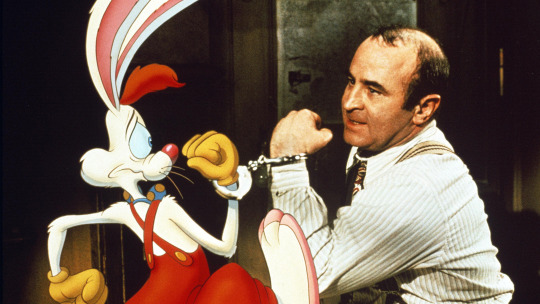
Blurring the Line.
As a new Space Jam film beams down to Earth, Kambole Campbell argues that a commitment to silliness and a sincere love for the medium is what it takes to make a great live-action/animation hybrid.
The live-action and animation hybrid movie is something of a dicey prospect. It’s tricky to create believable interaction between what’s real and what’s drawn, puppeteered or rendered—and blending the live and the animated has so far resulted in wild swings in quality. It is a highly specific and technically demanding niche, one with only a select few major hits, though plenty of cult oddities. So what makes a good live-action/animation hybrid?
To borrow words from Hayao Miyazaki, “live action is becoming part of that whole soup called animation”. Characters distinct from the humans they interact with, but rendered as though they were real creatures (or ghosts), are everywhere lately; in Paddington, in Scooby Doo, in David Lowery’s (wonderful) update of Pete’s Dragon.
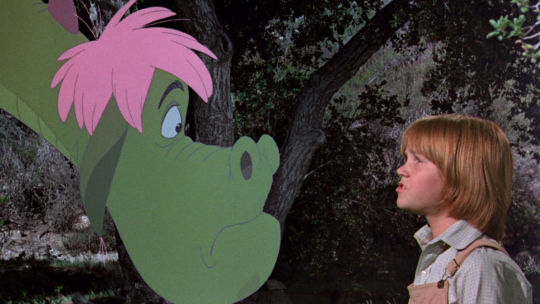
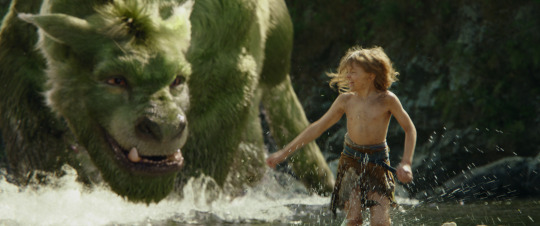
The original ‘Pete’s Dragon’ (1977) alongside the 2016 remake.
Lowery’s dragon is realized with highly realistic lighting and visual-effects work. By comparison, the cartoon-like characters in the 1977 Pete’s Dragon—along with other films listed in Louise’s handy compendium of Disney’s live-action animation—are far more exaggerated. That said, there’s still the occasional holdout for the classical version of these crossovers: this year’s Tom and Jerry replicating the look of 2D through 3D/CGI animation, specifically harkens back to the shorts of the 1940s and ’50s.
One type of live-action/animation hybrid focuses on seamless immersion, the other is interested in exploring the seams themselves. Elf (2003) uses the aberration of stop-motion animals to represent the eponymous character as a fish out of water. Ninjababy, a Letterboxd favorite from this year’s SXSW Festival, employs an animated doodle as a representation of the protagonist’s state of mind while she processes her unplanned pregnancy.
Meanwhile, every Muppets film ever literally tears at the seams until we’re in stitches, but, for the sake of simplicity, puppets are not invited to this particular party. What we are concerned with here is the overlap between hand-drawn animation and live-action scenes (with honorable mentions of equally valid stop-motion work), and the ways in which these hybrids have moved from whimsical confections to nod-and-wink blockbusters across a century of cinema.
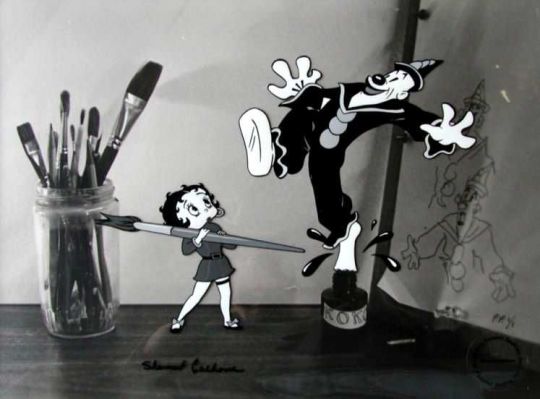
Betty Boop and Koko the clown in a 1938 instalment of the Fleischer brothers’ ‘Out of the Inkwell’ series.
Early crossovers often involve animators playing with their characters, in scenarios such as the inventive Out of the Inkwell series of shorts from Rotoscope inventor Max Fleischer and his director brother Dave. Things get even more interactive mid-century, when Gene Kelly holds hands with Jerry Mouse in Anchors Aweigh.
The 1960s and ’70s deliver ever more delightful family fare involving human actors entering cartoon worlds, notably in the Robert Stevenson-directed Mary Poppins and Bedknobs and Broomsticks, and Chuck Jones’ puntastic The Phantom Tollbooth.
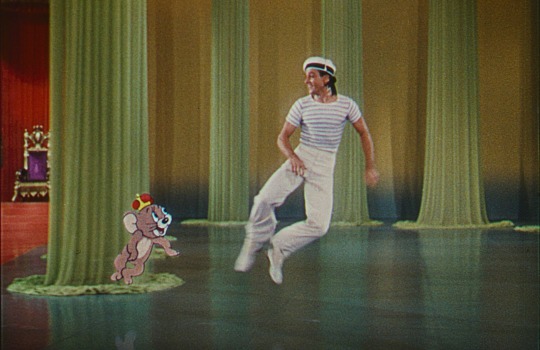
Jerry and Gene dance off their worries in ‘Anchors Aweigh’ (1945).
Mary Poppins is one of the highest-rated live-action/animation hybrids on Letterboxd for good reason. Its sense of control in how it engages with its animated creations makes it—still!—an incredibly engaging watch. It is simply far less evil than the singin’, dancin’ glorification of slavery in Disney’s Song of the South (1946), and far more engaging than Victory Through Air Power (1943), a war-propaganda film about the benefits of long-range bombing in the fight against Hitler. The studio’s The Reluctant Dragon (1941) also serves a propagandistic function, as a behind-the-scenes studio tour made when the studio’s animators were striking.
By comparison, Mary Poppins’ excursions into the painted world—replicated in Rob Marshall’s belated, underrated 2018 sequel, Mary Poppins Returns—are full of magical whimsicality. “Films have added the gimmick of making animation and live characters interact countless times, but paradoxically none as pristine-looking as this creation,” writes Edgar in this review. “This is a visual landmark, a watershed… the effect of making everything float magically, to the detail of when a drawing should appear in front or the back of [Dick] Van Dyke is a creation beyond my comprehension.” (For Van Dyke, who played dual roles as Bert and Mr Dawes Senior, the experience sparked a lifelong love of animation and visual effects.)
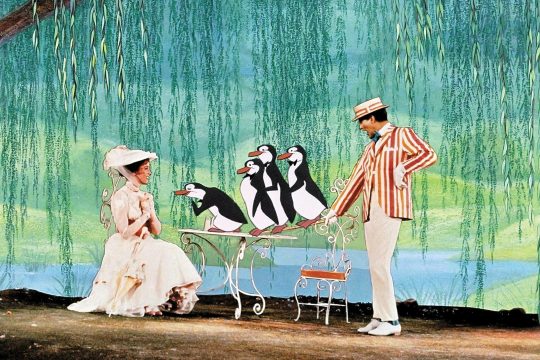
Julie Andrews, Dick Van Dyke and penguins, in ‘Mary Poppins’ (1964).
Generally speaking, and the Mary Poppins sequel aside, more contemporary efforts seek to subvert this feeling of harmony and control, instead embracing the chaos of two worlds colliding, the cartoons there to shock rather than sing. Henry Selick’s frequently nightmarish James and the Giant Peach (1996) leans into this crossover as something uncanny and macabre by combining live action with stop motion, as its young protagonist eats his way into another world, meeting mechanical sharks and man-eating rhinos. Sally Jane Black describes it as “riding the Burton-esque wave of mid-’90s mall goth trends and blending with the differently demonic Dahl story”.
Science-classroom staple Osmosis Jones (2001) finds that within the human body, the internal organs serve as cities full of drawn white-blood-cell cops. The late Stephen Hillenburg’s The Spongebob Squarepants Movie (2004) turns its real-life humans into living cartoons themselves, particularly in a bonkers sequence featuring David Hasselhoff basically turning into a speedboat.
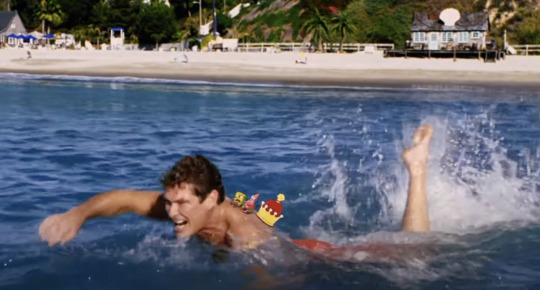
David Hasselhoff picks up speed in ‘The Spongebob Squarepants Movie’ (2004).
The absurdity behind the collision of the drawn and the real is never better embodied than in another of our highest-rated live/animated hybrids. Released in 1988, Robert Zemeckis’ Who Framed Roger Rabbit shows off a deep understanding—narratively and aesthetically—of the material that it’s parodying, seeking out the impeccable craftsmanship of legends such as director of animation Richard Williams (1993’s The Thief and the Cobbler), and his close collaborator Roy Naisbitt. The forced perspectives of Naisbitt’s mind-bending layouts provide much of the rocket fuel driving the film’s madcap cartoon opening.
Distributed by Walt Disney Pictures, Roger Rabbit utilizes the Disney stable of characters as well as the Looney Tunes cast to harken back to America’s golden age of animation. It continues a familiar scenario where the ’toons themselves are autonomous actors (as also seen in Friz Freleng’s 1940 short You Ought to Be in Pictures, in which Daffy Duck convinces Porky Pig to try his acting luck in the big studios).
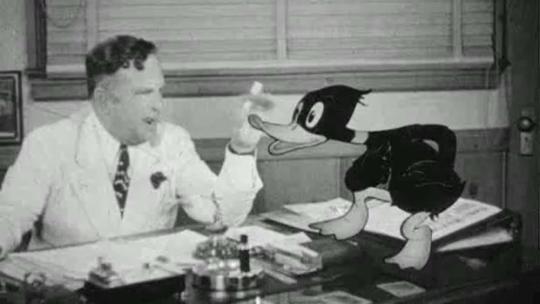
Daffy Duck plots his rise up the acting ranks in ‘You Ought to Be in Pictures’ (1940).
Through this conceit, Zemeckis is able to celebrate the craft of animation, while pastiching both Chinatown, the noir genre, and the mercenary nature of the film industry (“the best part is… they work for peanuts!” a studio exec says of the cast of Fantasia). As Eddie Valiant, Bob Hoskins’ skepticism and disdain towards “toons” is a giant parody of Disney’s more traditional approach to matching humans and drawings.
Adult audiences are catered for with plenty of euphemistic humor and in-jokes about the history of the medium. It’s both hilarious (“they… dropped a piano on him,” one character solemnly notes of his son) and just the beginning of Hollywood toying with feature-length stories in which people co-exist with cartoons, rather than dipping in and out of fantasy sequences. It’s not just about how the cartoons appear on the screen, but how the human world reacts to them, and Zemeckis gets a lot of mileage out of applying ’toon lunacy to our world.
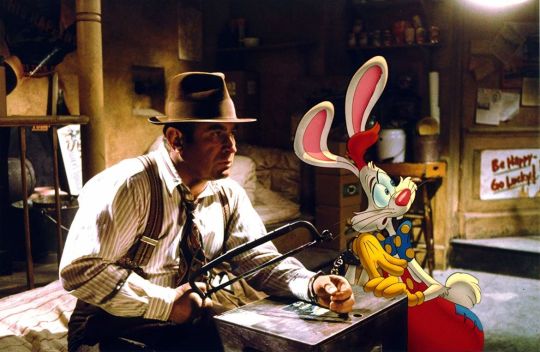
Bob Hoskins in ‘Who Framed Roger Rabbit?’ (1988).
The groundbreaking optical effects and compositing are excellent (and Hoskins’ amazing performance should also be credited for holding all of it together), but what makes Roger Rabbit such a hit is that sense of controlled chaos and a clever tonal weaving of violence and noirish seediness (“I’m not bad… I’m just drawn that way”) through the cartoony feel. And it is simply very, very funny.
It could be said that, with Roger Rabbit, Zemeckis unlocked the formula for how to modernize the live-action and animation hybrid, by leaning into a winking parody of what came before. It worked so perfectly well that it helped kickstart the ‘Disney renaissance' era of animation. Roger Rabbit has influenced every well-known live-action/animation hybrid produced since, proving that there is success and fun to be had by completely upending Mary Poppins-esque quirks. Even Disney’s delightful 2007 rom-com Enchanted makes comedy out of the idea of cartoons crossing that boundary.
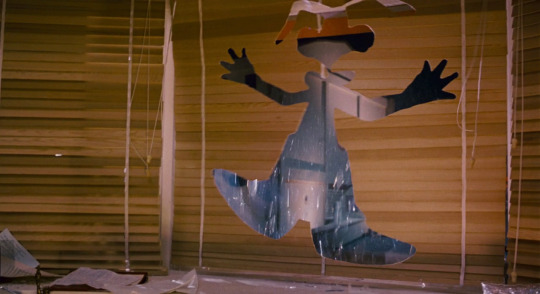
When a cartoon character meets real-world obstacles.
Even when done well, though, hybrids are not an automatic hit. Sitting at a 2.8-star average, Joe Dante’s stealthily great Looney Tunes: Back in Action (2003) is considered by the righteous to be the superior live-action/animated Looney Tunes hybrid, harkening back to the world of Chuck Jones and Frank Tashlin. SilentDawn states that the film deserves the nostalgic reverence reserved for Space Jam: “From gag to gag, set piece to set piece, Back in Action is utterly bonkers in its logic-free plotting and the constant manipulation of busy frames.”
With its Tinseltown parody, Back in Action pulls from the same bag of tricks as Roger Rabbit; here, the Looney Tunes characters are famous, self-entitled actors. Dante cranks the meta comedy up to eleven, opening the film with Matthew Lillard being accosted by Shaggy for his performance in the aforementioned Scooby Doo movie (and early on throwing in backhanded jokes about the practice of films like itself as one character yells, “I was brought in to leverage your synergy!”).
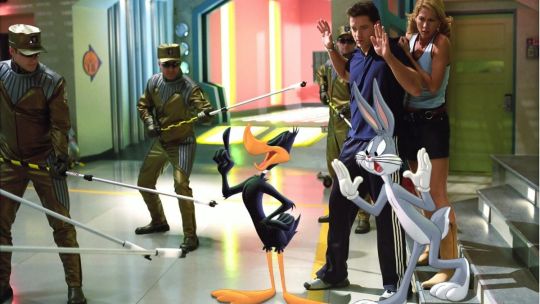
Daffy Duck with more non-stop banter in ‘Looney Tunes: Back in Action’ (2003).
Back in Action is even more technically complex than Roger Rabbit, seamlessly bringing Looney Tunes physics and visual language into the real world. Don’t forget that Dante had been here before, when he had Anthony banish Ethel into a cartoon-populated television show in his segment of Twilight Zone: The Movie. Another key to this seamlessness is star Brendan Fraser, at the height of his powers here as “Brendan Fraser’s stunt double”.
Like Hoskins before him, Fraser brings a wholehearted commitment to playing the fed-up straight man amidst cartoon zaniness. Fraser also brought that dedication to Henry Selick's Monkeybone (2001), a Roger Rabbit-inspired sex comedy that deploys a combo of stop-motion animation and live acting in a premise amusingly close to that of 1992’s Cool World (but more on that cult anomaly shortly). A commercial flop, Back in Action was the last cinematic outing for the Looney Tunes for some time.
Nowadays, when we think of live-action animation, it’s hard not to jump straight to an image of Michael Jordan’s arm stretching to do a half-court dunk to save the Looney Tunes from slavery. There’s not a lot that can be fully rationalized about the 1996 box-office smash, Space Jam. It is a bewildering cartoon advert for Michael Jordan’s baseball career, dreamed up off the back of his basketball retirement, while also mashing together different American icons. Never forget that the soundtrack—one that, according to Benjamin, “makes you have to throw ass”—includes a song with B-Real, Coolio, Method Man and LL Cool J.
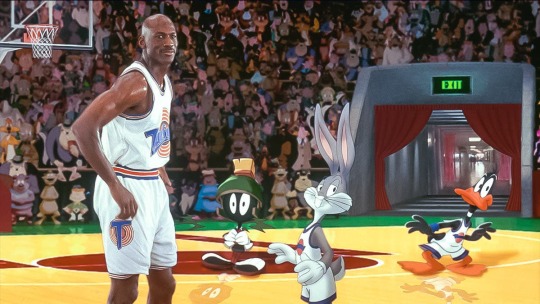
Michael Jordan and teammates in ‘Space Jam’ (1996).
Space Jam is a film inherently born to sell something, predicated on the existing success of a Nike commercial rather than any obvious passion for experimentation. But its pure strangeness, a growing nostalgia for the nineties, and meticulous compositing work from visual-effects supervisor Ed Jones and the film’s animation team (a number of whom also worked on both Roger Rabbit and Back in Action), have all kept it in the cultural memory.
The films is backwards, writes Jesse, in that it wants to distance itself from the very cartoons it leverages: “This really almost feels like a follow-up to Looney Tunes: Back in Action, rather than a predecessor, because it feels like someone watched the later movie, decided these Looney Tunes characters were a problem, and asked someone to make sure they were as secondary as possible.” That attempt to place all the agency in Jordan’s hands was a point of contention for Chuck Jones, the legendary Warner Bros cartoonist. He hated the film, stating that Bugs would never ask for help and would have dealt with the aliens in seven minutes.
Space Jam has its moments, however. Guy proclaims “there is nothing that Deadpool as a character will ever have to offer that isn’t done infinitely better by a good Bugs Bunny bit”. For some, its problems are a bit more straightforward, for others it’s a matter of safety in sport. But the overriding sentiments surrounding the film point to a sort of morbid fascination with the brazenness of its concept.
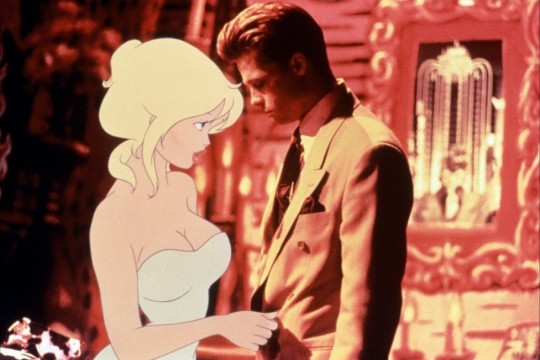
Holli Would (voiced by Kim Basinger) and Frank Harris (Brad Pitt) blur the lines in ‘Cool World’ (1992).
Existing in the same demented… space… as Space Jam, Paramount Pictures bought the idea for Cool World from Ralph Bakshi as it sought to have its own Roger Rabbit. While Brad Pitt described it as “Roger Rabbit on acid” ahead of release, Cool World itself looks like a nightmare version of Toontown. The film was universally panned at the time, caught awkwardly between being far too adult for children but too lacking in any real substance for adults (there’s something of a connective thread between Jessica Rabbit, Lola Bunny and Holli Would).
Ralph Bakshi’s risqué and calamitously horny formal experiment builds on the animator’s fascination with the relationship between the medium and the human body. Of course, he would go from the immensely detailed rotoscoping of Fire and Ice (1983) to clashing hand-drawn characters with real ones, something he had already touched upon in the seventies with Heavy Traffic and Coonskin, whose animated characters were drawn into real locations. But no one besides Bakshi quite knew what to do with the perverse concept of Brad Pitt as a noir detective trying to stop Gabriel Byrne’s cartoonist from having sex with a character that he drew—an animated Kim Basinger.
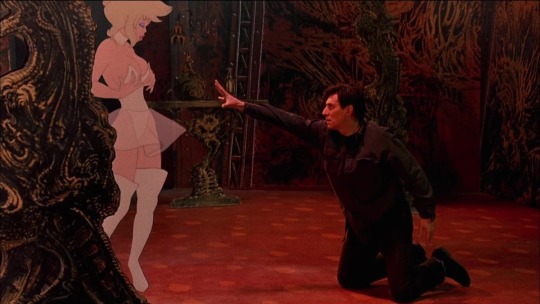
Jack Deebs (Gabriel Byrne) attempts to cross over to Hollie Would in ‘Cool World’ (1992).
Cool World’s awkwardness can be attributed to stilted interactions between Byrne, Pitt and the animated world, as well as studio meddling. Producer Frank Mancuso Jr (who was on the film due to his father running Paramount) demanded that the film be reworked into something PG-rated, against Bakshi’s wishes (he envisioned an R-rated horror), and the script was rewritten in secret. It went badly, so much so that Bakshi eventually punched Mancuso Jr in the face.
While Cool World averages two stars on Letterboxd, there are some enthusiastic holdouts. There are the people impressed by the insanity of it all, those who just love them a horny toon, and then there is Andrew, a five-star Cool World fan: “On the surface, it’s a Lovecraftian horror with Betty Boop as the villain, featuring a more impressive cityscape than Blade Runner and Dick Tracy combined, and multidimensional effects that make In the Mouth of Madness look like trash. The true star, however, proves to be the condensed surplus of unrelated gags clogging the arteries of the screen—in every corner is some of the silliest cel animation that will likely ever be created.”
There are even those who enjoy its “clear response to Who Framed Roger Rabbit”, with David writing that “the film presents a similar concept through the lens of the darkly comic, perverted world of the underground cartoonists”, though also noting that without Bakshi’s original script, the film is “a series of half steps and never really commits like it could”. Cool World feels both completely deranged and strangely low-energy, caught between different ideas as to how best to mix the two mediums. But it did give us a David Bowie jam.
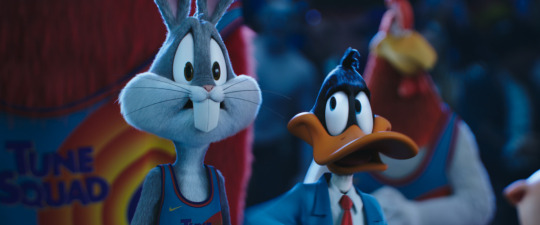
‘Space Jam: A New Legacy’ is in cinemas and on HBO Max now.
Craft is of course important, but generally speaking, maybe nowadays a commitment to silliness and a sincere love for the medium’s history is the thing that makes successful live-action/animation hybrids click. It’s an idea that doesn’t lend itself to being too cool, or even entirely palatable. The trick is to be as fully dotty as Mary Poppins, or steer into the gaucheness of the concept, à la Roger Rabbit and Looney Tunes: Back in Action.
It’s quite a tightrope to walk between good meta-comedy and a parade of references to intellectual property. The winningest strategy is to weave the characters into the tapestry of the plot and let the gags grow from there, rather than hoping their very inclusion is its own reward. Wait, you said what is coming out this week?
Related content
Rootfish Jones’s list of cartoons people are horny for
The 100 Sequences that Shaped Animation: the companion list to the Vulture story
Jose Moreno’s list of every animated film made from 1888 to the present
Follow Kambole on Letterboxd
#kambole campbell#mary poppins#ralph bakshi#hayao miyazaki#ghibli#disney#who framed roger rabbit#roger rabbit#spongebob squarepants#spongebob#animation#live action animation#live action animation hybrid#stop motion animation#stop motion#wes anderson#brad pitt#bob hoskins#genre#space jam#space jam a new legacy#michael jordan#lebron james#looney tunes#bugs bunny#daffy duck#warner bros#2d animation#letterboxd
26 notes
·
View notes
Text
What was your first?
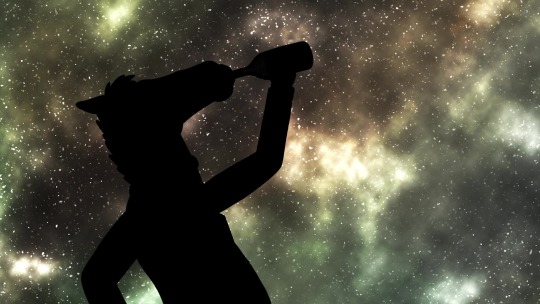
So a horse walks into a rehab and says “ouch”. And not a lot. Then a great deal. While also saying nothing. It’s BoJack, in rehab, and going about as well as you might think!
“The Stopped Show” may not have been much about BoJack, but “A Horse Walks Into A Rehab” makes up for it by being 99.9% BoJack, setting aside the brief appearance of the other characters to set their stages for when we get back to them. Diane’s in a shitty motel, Todd’s in a seedy alleyway, Princess Caroline has her porcupine baby, and Mr. Peanutbutter continues to deliver cheer while everything around him burns AND drowns. I’ve now touched base with them about as much as the season premier, and we’ll get busy ignoring them.
As I said, BoJack is the star today, and we continue his quest for ... what, exactly?
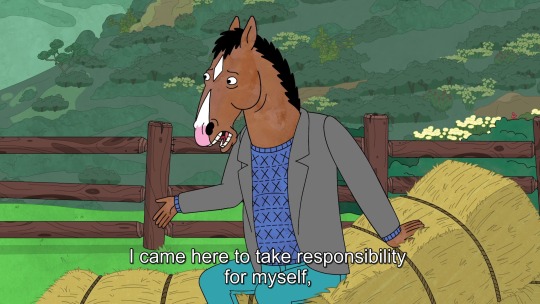
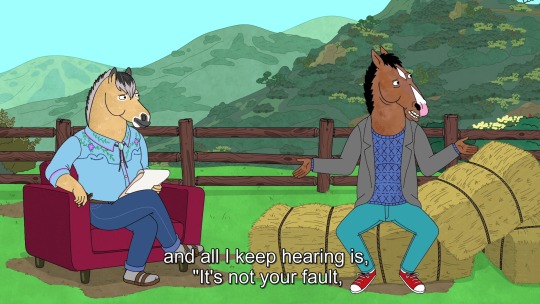
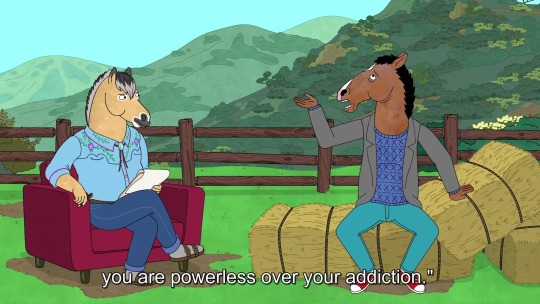
Trying to pin it down, that “what is BoJack looking for” question, it’s a lot harder to answer than I expected, which marks another instance of me fucking myself, GOOD JOB ME.
I initially said “punishment”, but that isn’t true, or a least, is too easy. BoJack wants accountability for his actions -- which is a very different thing than punishment -- but he wants it in a way that also absolves him from having to do any work to rise above it. So you’d think he’d love this, the constant claim in rehab that he’s powerless. It seems like the answer to everything, a blanket pass to excuse his behaviour because he’s powerless. Why doesn’t he? I’m not sure I’m entirely clicking with the heart of that, so come with me as I have a poke at it.
For one, I doubt very much rehab would begin and end with “you’re powerless, oh well”. Addiction is some nasty business, but in and of itself, it’s a symptom, not the problem. That in mind, we swing back then to BoJack having to put in the work, only now it’s with the removal of his favourite coping mechanisms.
I think what he was hoping to get out of rehab was more along the lines of “Vodka is a naughty irresistible siren who topples even the most noble of men, but if you cross your eyes and click your heels, you’ll be free from her spell forevermore.” And yeah, no.
I think we get some of that in how, for a while, rehab seems to suit BoJack.

To the point I very specifically said to Doc as I was watching this, “Oh shit, did BoJack just become even MORE insufferable?” He’s okay so long as he has the comfort of the scripts and the regimented plant therapy and the same hike every day. When he starts to get fucked is when he has push further, when he has to work harder, when the treatment demands MORE.
“I notice you tend to deflect when I ask you about the source of your addiction,” his therapist says, causing BoJack to immediately deflect, first with a joke and then, when that doesn’t work, attacking the entire system. Getting to the root of his problem is the last thing BoJack wants, to the point where the entire episode ITSELF is one giant deflection. I made a joke in passing up there about our passing moments with each of the other main characters, but that’s actually it, that’s the heart of this episode.

Each of these are efforts by the episode to deflect what’s going on NOW, tempting us with something shiny and interesting, if only we’d take the bait. I ONLY JUST MADE THIS CONNECTION WELL FUCKING DONE SHOW
And of course, there’s Jameson’s story, which is part deflection, part contrast. She’s intended to appear at first like someone BoJack can relate to, a Sara Lynn Pt. 2 that he wants to save and in whom he sees so much of himself. In equal parts, he’s the adult trying to guide her and the force enabling her, and I’d have to do a bit more thinking on whether I thought his success with her was about him walking both sides of that line, or Jameson just, at the end of the day, being lucky. Either way, it’s also not really about her, so much as BoJack talking a really good game at her, while giving her all the tools to make the worst choices.
Which is, I think, where the episode finally settles. BoJack’s choices have been his own, but they aren’t made in isolation. Throughout this episode, we get moments, presented in reverse chronological order, that could on their own answer that key question: When was the first time you drank?

To settle your nerves to get through a scene everyone was counting on you to nail?

To fit in with the cool kids at high school?

To win your father’s approval?
What’s brilliant to me about each of these flashbacks is that the further into the past we go, the more willing we are to absolve BoJack. In the first, he’s a professional actor required to kiss an attractive and consenting fellow professional in the course of a performance. Nervous? Makes total sense. Getting plastered to do it? LESS SENSE.
The high school one is the most damning, which I adore. BoJack’s the butt of some light bullying by the jock, and I don’t mean to completely dismiss that it sucks, but the remainder of events before he starts in on the beers shows he’s hardly an absolute social pariah. And even if he were, once he begins to drink, BoJack doesn’t just become the life of the party, he becomes cruel (demonstrating quite well that jokes aren’t his only tool of deflection). Worse, that he KNOWS he’s doing it, but cares more about his positive attention than their negative. Still, BoJack’s a kid and peer pressure is a hell of a thing. This isn’t a good look, but it’s also not damning, if he’d come to learn from it.
Now we jump the line to, I’d guess, ten or eleven year old BoJack, who walks in on his father having an affair with his secretary, but too young to recognize what he’s seen. Butterscotch can’t take the risk though, so he effortlessly manipulates little BoJack into getting drunk and passing out, then uses BoJack’s shame about it to keep him quiet on the whole evening. UNDER THE GUISE OF BEING HIS FRIEND AND DOING HIM A FAVOUR BY THE WAY. No question, Butterscotch is a son of a bitch, and the only thing BoJack did wrong here was crave his parent’s love.
Even with the high school one being a little more grey, they’re all pretty cut and dry. Remember that we’re following the thread of “When was the first time you drank?” and to land on the answer “When my unrepentantly dickish father lied to me to save his own ass” puts a pretty solid punctuation mark on the whole affair. Addiction may not be at fault, but Butterscotch Horseman is. Case closed, we can go home.
BUT WAIT WHAT’S THIS
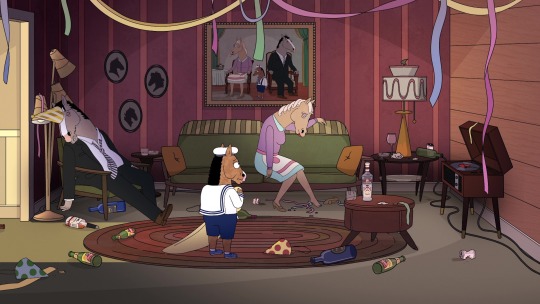
Right at the end, when you think we’re done, there’s one more flashback. A party of some sort, possibly New Year’s. The house sounds empty, there’s only the looping of the record player, stuck repeating the same five seconds again and again and again. Butterscotch and Beatrice are passed out drunk, judging from the empty bottles around them. Was it a good party? A bad one? She has her back to him and they’re about as far apart as they could get while still remaining in the room, but also, nothing’s broken? It’s impossible to know.
What we do know is that BoJack, aged about where we saw him in the “Free Churro” flashback so maybe seven or so? Very young, at any rate, and he’s alone. There doesn’t appear to be anything in the room for a child, so it’s probably fair to say he wasn’t included in the festivities. Did he have something to do instead? His own party maybe? Friends to play with, someone to watch him? Did he even get dinner? From what we’ve seen, “no” is a much more likely answer to any or all of these.
AND NOW THE FIRST TO PUNCH YOU IN THE HEART
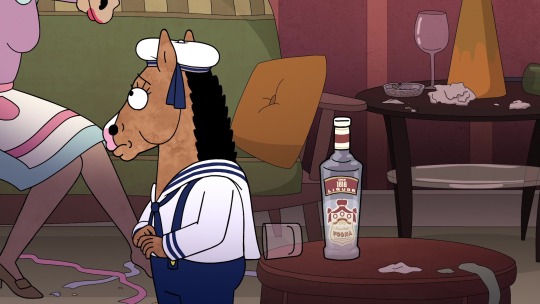
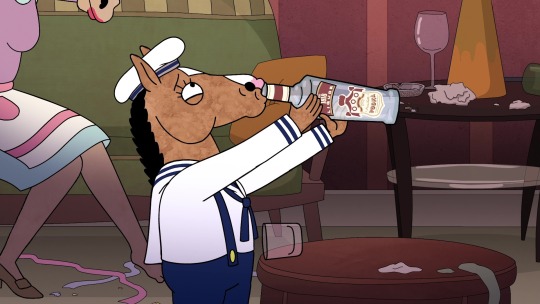
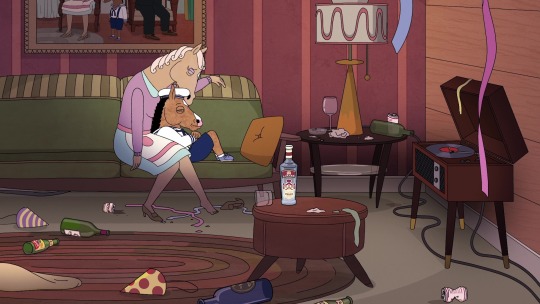
Tiny BoJack knocks back several gulps of vodka (like a fucking pro, may I add), then crawls onto the couch next to his unconscious mother, pretending for just a few minutes that she’s cuddling him until he, too, will fall into a drunken slumber.
RIGHT SO WHAT THE FUCK DO WE DO WITH THIS JESUS WEPT
Had you told me “Just wait, seven year old flashback BoJack is going to muddy the hell out of this” I wouldn’t have ... okay, well, I know the show, so I probably would’ve believed you, but I would’ve been preemptively grumpy.
This isn’t his fault! But it is! This isn’t his parent’s fault, but it super super is! Nobody MADE BoJack drink the vodka, as the scene goes to great lengths to show. There is nobody to tell him to do anything at all. Beatrice is three fucking sheets to the wind, she has no idea he’s there and he could have pretend cuddled all night AND stayed sober. Did baby BoJack, like adult BoJack, take the drink to calm his nerves for an expression of physical intimacy? Would baby BoJack have even known that was an option? Remember, this is framed as the answer to the question “When was the first time you drank?” Not “took a drink”, but “you DRANK”, the phrasing of which I think is important. It’s all about the root of the problem. What I get out of that question is then is “the first time you drank to numb yourself”.
Baby BoJack is looking at this disaster, this mess that is his every day no matter how many party hats and streamers you stick on it, and he wants anything else at all. So he turns to the easiest thing he knows will take it away the fastest. The situation isn’t his fault. The opportunity isn’t his fault. But the response IS, in a way that EVEN AS I SAY IT, makes me feel shitty.
CONGRATS BOJACK HORSEMAN FOR MAKING ME SEE A LITERAL CHILD SLAMMING BACK VODKA STRAIGHT FROM THE BOTTLE AND MAKING ME GO “okay, but”.
SEASON SIX SHOULD BE A WALK IN THE PARK
#jet wolf watches bojack#it’s no wonder the answers for bojack are so hard to find#when even the goddamn QUESTION requires a dissertation and three hundred caveats#oh i didn't have a place for it really in this essay#but i love the use of the space/planetarium overlay when bojack is really wrestling with his urges
22 notes
·
View notes